#sider order dlc
Explore tagged Tumblr posts
Text
okay since i finally beat side order half a year late in the span of a day, here is my personal thoughts on it, and what i liked vs what i didnt like:
it was. okay. but nowhere near as good as octo expansion. my main problem is that i feel like they didnt do enough with it. like the story is so minimal. it's like…. that's it?
i was hoping they would go more into eight's history and trauma and all that. and they did reference that a little bit, but only ever in hints. but then again i havent beaten the post-game yet so i could be wrong
also i kept hearing people talking about how hard it was, but for me personally it didnt feel nearly as hard as octo expansion but maybe thats just because ive been playing splatoon for a long time so i've gotten better at the game since i played octo expansion
i did love the visuals though. so pretty. and ngl one of my fave parts of the game was asynchronous rondo. because it seems that that boss is supposed to represent tartar. and also its design and song that plays during it was SO fucking cool
i just think the game has a great concept, but the story did not deliver. also the gameplay is too repetitive after a while. maybe im just biased and have too high expectations though because octo expansion is my favorite game of all time (yes im counting it as its own standalone game because it basically is)
at least this made me appreciate splatoon 3's main campaign better. because at least that one had fun story, lore, and banter, even if the ending and villain being a blatant octo expansion ripoff was disappointing
what i liked about the game: -the visuals -the concept -the designs of the enemies and bosses (especially asynchronous rondo; i love the callbacks to tartar in its design. it feels like the closest we're getting in the game to addressing 8's trauma) -def1sh finally appearing in the games wahoo -pearldrone is so cute -pearl and marina flirting lol -is fun the first few tries, before it starts to get boring and repetitive
what i disliked about the game: -poor writing, not enough story -it just feels so… hollow. there isn't the emotional investment in it that was present in octo expansion -wished it delved more into 8's and marina's psychology instead of only doing that in hints and implications -while there is some funny and unique dialougue like in octo expansion, it feels like there isn't that much. i kinda ended up skipping through most conversations because they were pretty bland, and weren't nearly as entertaining as the banter in octo expansion -it kinds gets really repetitive and boring after a while, especially compared to octo expansion where every level is super different. it needs more level variety and types of objectives imo -the ones where you gotta kill all those sunfish things are WAY too easy. all you need to do is speedrun getting enough points for a special and then you can just one-shot them all lol -i wish there were more bosses, because going against the same ones over and over gets tedious really quickly -why isn't there an infinite mode? i want to challenge myself to see how high a floor i can get :{ -wish it went more into dedf1sh, because it feels like they're just kinda. there. doing nothing. for the entire story. kinda wasted potential. you could remove them from the game and nothing would change -when will tartar (my fave character) return from the war it's one of my fave villains of all time oughhh.. the closest we got was asynchronous rondo. and also the main villain which is yet again an obvious tartar expy
0 notes
Text
everybody rushing to give agent 4 something to do in side order in their aus and fanarts. i see a pattern in the splatoon fandom
#blinky speaks#splatoon#side order#sider order spoilers#splatoon 3#agent 4#ive definitely seen this happen w pre dlc dedfish. and a couple others#this is just what u gotta do sometimes. a game will give u a cool concept that it doesnt elaborate on and u gotta do that instead#this is me w grizz btw <3 sobs
64 notes
·
View notes
Text
Splatoon 3's Side Order is going to drop soon and I just want to say some thoughts that I hope to age well before it releases.
I truly hope this Agent 4 is actually in it, everyone's been saying this could be them but we can't be for certain!! If it isn't it'd be such a missed opportunity :(

I know a lot has changed since the first trailer, but I hope the aesthetic they used in the art they used for it is still in tact, I think the art and aesthetic it has is wonderful.
There was a 90 minute interview where they say "We saw Marina, she is in fact there, and Boy she's there! (laughs)" WHAT DID YOU MEAN BY THIS???? I'M SO CURIOUS ARE THEY GONNA DO SOMETHING WITH MARINA?????
I don't have to hope for this one but I'm SUPER excited for the new music that will be great. I hope there's gonna be a song I like as much as The Plan the Octo Expansion :)
I'm hoping that the Splatoon 2 Hub world will be available after you beat the game, I'm also hoping even though that didn't show it in the trailers that we get new hairstyles soon!
I hope they'll add back some Octo Expansion gear into Splatoon 3!
that's all I can think of, i'm sure Side Order will be peak can't wait
12 notes
·
View notes
Text
I wanna eat the paint chips from side order
#different colours = different flavours? hmm#splatoon#splatoon 3#splatoon sider order#splatoon 3 side order#side order#splatoon 3 dlc
17 notes
·
View notes
Text
Okay, so Sider Order.
Here's a few of my random observations and thoughts:

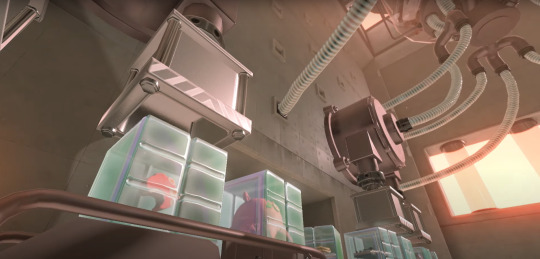
So here it looks like Pearl Drone is flying Eight in through a window? Ands it looks like some kind of factory or packaging plant. I've heard folks saying that the things being packed in boxes could be something akin to Mem Cakes from Octo Expansion...Perhaps and early sign that Kamabo.Co is involved.
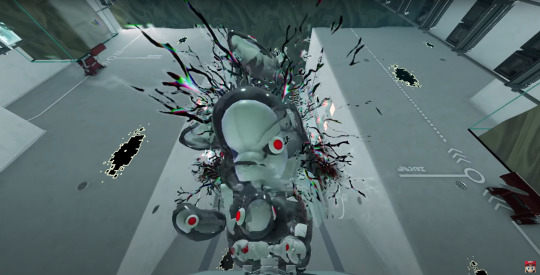
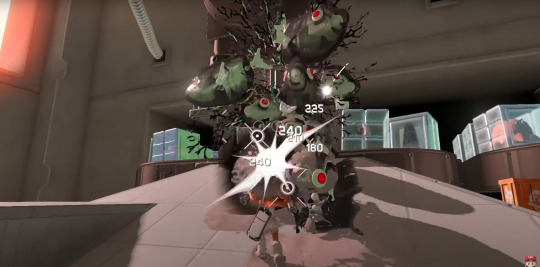
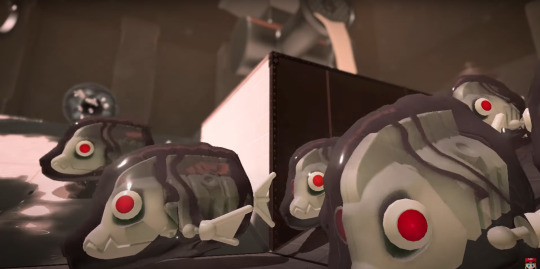
FINALLY, ENEMIES THAT AREN'T OCTARIANS!
Well, these Goo-bers are interesting. Many have pointed out that they resemble fish species that feed on coral. But I also want to add that they have an "undead" aesthetic even more overt than they sanitised people. Someone on Tiktok pointed out that they look like fossils, and the "jelly" surrounding the bones (and what seems to be their ink) could be a visual pun on "fossil fuels". Note how the "bursts" of fluid don't look anything like the ink that other entities in the series use.
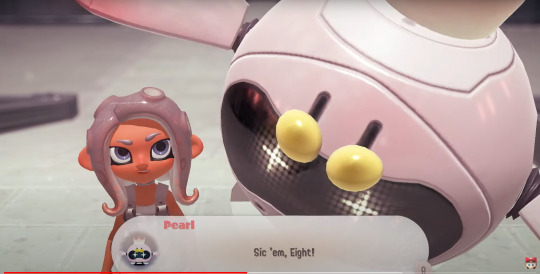
This basically confirms that we'll be playing as Agent Eight. After the first teaser I saw a lot of theories about being a clone floating around.
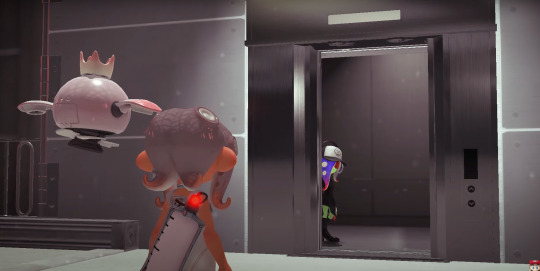
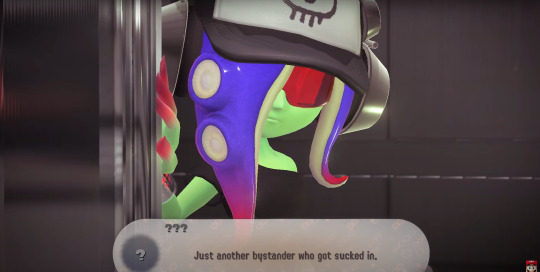
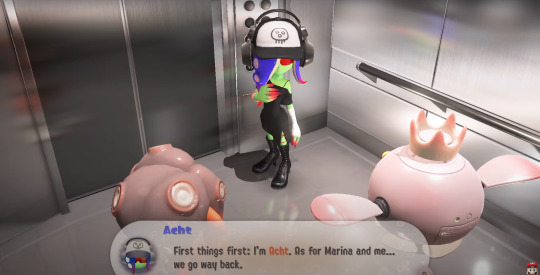
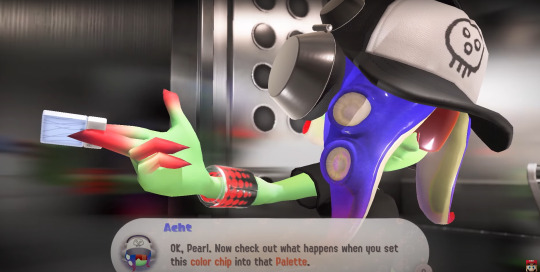
Now everyone's going crazy about DedF1sh (Or Acht, as they are referring to themselves here.) There's some interesting dialogue here. First of all, "another bystander who got suck in here", so, "another" in this context could be themselves since she's talking to Eight and Pearl, but there could be a chance that we could encounter more people who have ended up at the Spire of Order. Plus, she's most likely not here of her own accord, from the "bystander sucked in" part (assuming she's telling the truth). People are being brought here.
Secondly, Acht mentions knowing Marina from "way back", so we could be getting deeper into Marina's backstory (another common theme in the fan theories). Dedf1sh also introduces the player to the Chip and Palette system, which are a core part of the DLC's gameplay loop, since they appear to be going for a Rogue-like. Ther chips kind of remind me of the paint colour swatches you get at a hardware shop, combined with computer chips (that's not totally relevant, I'll admit).

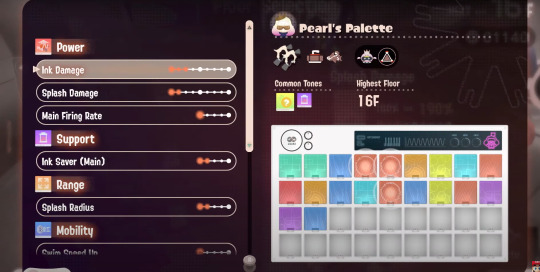
More stuff to do with the gameplay. It looks like each floor has a few variants with different difficulties and objectives, which reward a currency, most likely used to buy chips and other upgrades. It's giving that impression almost that the Spire is another "testing facility", akin to the Deep Sea Metro. Hopefully this places doesn't contain any blenders.

Unusual way of spawning in, where you can see Eight's soul ghost...thing enter a polygonal model before fully forming. There does seem to be a lot of digital glitchy stuff going on. Maybe some virtual reality elements?

Finally, what I think looks like a boss arena (although some have suggested that this machine is the Big Bad itself). Upon close inspection, the "faces" scattered around it are covered in the oil and are moving around a bit. Looks kinda like Tartar during the final confrontation when he for some reason had a blob of sanitised goop on his face. I might be reading too much into this.
I mean, if they wanna bring Tartar back, he is an AI, so they could say a back-up copy of him was found somewhere. Like, a time capsule with the Professor's crappy spare USB or somethin' idk.
Anyway, that's all I got for know. Just gotta wait for Spring.
#splatoon#splatoon 3#splatoon side order#splatoon dlc#dedf1sh#splatoon off the hook#splatoon agent 8
56 notes
·
View notes
Text
Speculations about the Vinyl Art

Recently, we had some bits of art that heated up the speculations about the Black City. I write here a detailed set of observations, interpretations and lore speculations.
Most of the images were taken from the source posts of @felassan [here, here, here and here] and andarateia, and I copy-pasted a lot from my draft here. Of course, many of these interpretations are shared with the original authors too since it’s obvious and natural to do these interpretations [specially if one tries to work under the principle of the Occam’s razor]. In others, I may differ, of course.
The vinyls

They are named “Golden City Merge” [blue-teal one] and “Black City Splatter” [Yellowish one].
Golden City Merge
It has a blue-teal colour around a yellow centre that may be golden.
One of these colours coincides with the codex Vir Dirthara: Homecoming, which claims that a “city home” is made of blue glass with spiralling up towers, so only through this detail in colour, and the shape of the city we see in the cover of the vinyl, we can assume that Elvhenan “homes/cities” may have been of this style too. Here, it’s all the lore we can link to these colours.
The only piece of [unreliable] lore we have to blandly link the Golden City with Arlathan is Tyrdda Bright-Axe Path. In it, the man who wanted Trydda’s hand in marriage wanted to lead an army to the North, in order to reach the Golden City. From an Alamarri’s point of view, Arlathan was also in the north, crossing the Boeric Ocean [if we assume, too, that Arlathan was inside the Forest of Arlathan, which is a reasonable speculation given the peculiarities of the place, read The Missing for more details]. This information had been shared to him via dreams by a demon. It is a bland piece of lore because this is a tale that was transmitted through generations, orally, and we know how sensitive to change and modification this process is.
If we keep all these bland speculations, we can play with the idea of assuming that the Golden City may have been Arlathan. If Arlathan was surrounded by Arlathan Forest, the tree theme in the art of the vinyl would add more consistency to this speculation.
Black City Splatter
It has a black splatter over a worn-out, pale yellow colour. It may be considered a “sick” yellow even.
What we speculated from Corypheus’ design is that, due to the way his face was deformed and pieces of metal [or maybe red lyrium] were incrusted in him, it always looked like “something hot exploded” on his left side face [which, coincidental, it was the side which eye was, apparently, blind in his taror card, however, the unmatched eyes is completely inconsistent along art and games]. I talked about this long ago in the end of the post DLC: Legacy and in DA2: Eyes. My point in bringing this desing detail is to say that, when the Magister stepped into the Black City, something “exploded” and melted them, and no matter the Andrastian Myth, we can see it clearly in the design of Corypheus and The Architect. That this vinyl has this colour design and name reinforces the idea that the Magisters unbalanced something when they entered, and it exploded, catching them in the explosion.
The Architect also has a design in his face that tells us that he was melted, and some things were incrusted in his body [I was always curious how a “dragon horn” seems to protrude from his neck]
Although they are focused on the Andrastian Myth, the Tevinter Mosaics seem to reinforce the idea that, when the Magister entered the Black City, they were burnt as well [again, the Myth claims it was the Maker, I suspect the truth is different, but the repetition of melting design in the only two Sidereal Magisters we saw can’t be overlooked].
As a speculation we can assume that the Black City was containing and working properly in the way that Solas had left it when he sealed the Evanuris, until the Sidereal Magisters entered and caused a “burning explosion”. It’s not clear if they caused it with their entering to the City, or touched something that caused it.

the middle of the vinyls show the map of Fade we had in DAO
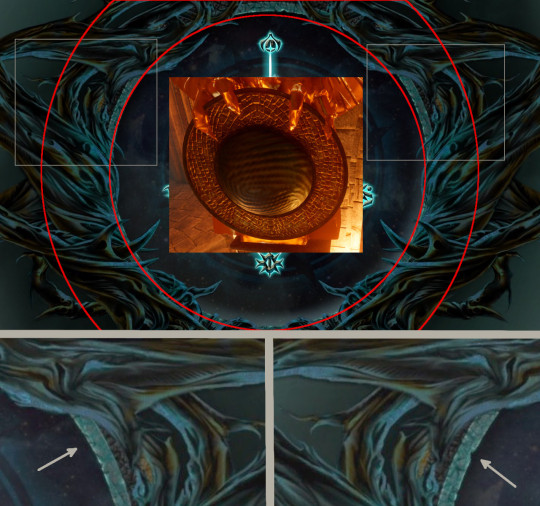
Curious thing, an extraction of this map from the DAO game files, shows that it was surrounded by thorny vines, or something that inspires the idea of thorny vines. And it covers a ring made out of mosaics, very similar to the style of the Golden Ring.

It is also interesting that each of the apexis in the vinyl shows a circle that, according to what my eye can distinguish in that small image, may represent another Golden Ring. These golden rings have been appearing all over the game, specially in DAI.
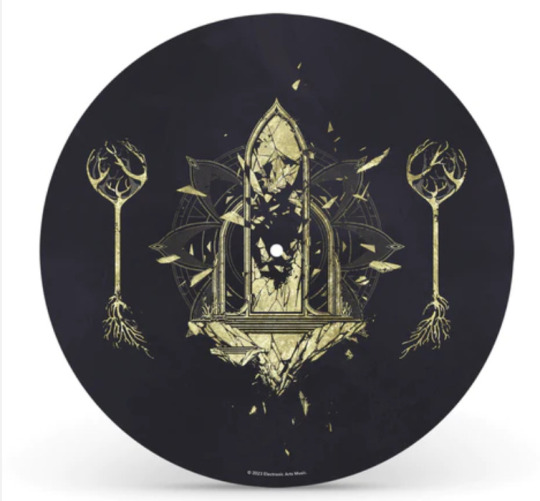
The back of the vinyl shows an eluvian floating on an isle, and two Elven Tree Statue. There is a series of detail we can notice here:
The eluvian is shattered. This gives us the idea that the system protecting the Black City, according to what we have concluded along the posts Murals in DAI: Basics and “The Creation of the Veil”, was broken and whatever kept inside is now free.
Behind it, we see the shape of 6 more eluvians, in a pattern that looks like a flower. The flower may be a mere aesthetic for the vinyl, or could be a representation of the Elvhenan [since the elvhenan banner has a lot of flowers in it, check Elven Ruins to see it], or it may be related to the last bloom of a flower related to the codex “A Flowering Imago” [explanation attempted in the post Ancient Elven codices; Vir Dirthara]
The Chant of Light, if it’s to be trusted with some grains of elvhenan knowledge that was leaked into its text, claims that the Black City has seven gates that, one shattered, will allow the pass of Darkness [Read exaltations in Chant of Light - Part 2]. Darkness has always been associated with the Blight, so I think this piece of info may have been part of elvhenan knowledge that made it into the religious text in ways I explained in “The Chantry and the Mythology of the Chant of Light“. If the Eluvians are gates to the Black City, the seven ones are represented in this vinyl illustration.
The Elven Tree Statues have been seen in many opportunities along the DAI game, and its symbolism is not clear. In the Shattered Library it appears as a source of Fade power, crackling with green energy until the Inquisitor approaches and absorbs it. In the Elven Mountain Ruins, appears as central along the corridor of the Forgotten Sanctuary, and as the main symbol of the Smoking Tower. In Ancient Elven codices; Fen’Harel’s mountain ruins I made a deep analysis of potential relationships of this tree with a source of power to create “in-between” spaces, as well as related to lyrium, the power of the Titans, a Titan’s heart, or Fade itself. It also appears as central in the puzzle of the Dead Hand, where energy is gathered in it, while being surrounded by Golden Rings.
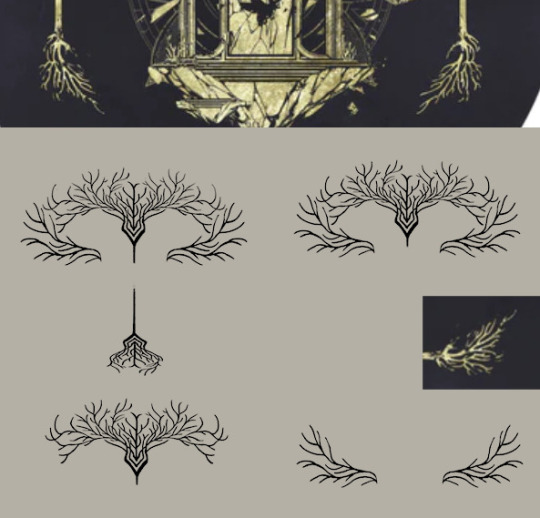
What seems to have in common in all these analysis is that these trees are related to power, and potentially a power to create worlds that may be associated with Titans. Maybe they represent the power that Mythal found when she killed the Titan, according the mural “The Death of a Titan”, and this was the reason why the Evanuris killed her in order to acquire this power. What’s curious is that in this illustration of the vinyl, we see, for the first time, their roots. Which are quite similar to the design of the Mythal’s Vallaslin.
What is this eluvian representing for the Golden/Black City?
The shape of the eluvian is not something to read too much in my opinion. We find these frames in many elvhenan buildings, with other gods too. Even with Andruil in the Shattered Library; Inverted Ward. I think that we have to read it simply as “Elvhenan style for frames” which is deeply related to the shape of door and window frames too, which also carries similar function in the Eluvians: they are “doors” or “windows” to other places in between. I think it’s the typical elvhenan style for frames in general [details in Patterns and Styles: Elvhenan]. There are tons of these tri-style eluvians without flanked beasts spread all over the Elven Ruins. The Crossroads or The Crossroad [Base Game] also show a lot of these eluvians, sometimes flanked by statues, sometimes don’t. A quintuple-style shape is also the shape of the big gates into the Temple of Mythal [check Temple of Mythal, What pride had Wrought: Part 1]. The idea of this shape is that it’s an eluvian with smaller and broader eluvians at the side, overlapped behind, so the final outline looks like it.
The Eluvians are related to the Elvhenan, but also to the Titans in a design point of view: they glow in a similar way as lyrium does or have a similar colour to it. In DAO, we lost Tamlen because an Eluvian was infected by the Blight [and we can justify DAO eluvian as corrupted ones since all of them were non-working or blighted]. So far we know, objects can’t be infected by the Blight, only living things, hence the idea that Eluvian are made of “something alive”. It’s not clear how alive it has to be, since we also know a creepy set of objects that exude “life” in a weird way: The Taken Shape set.
The Eluvians we found in DAO were “Tevinter Eluvians”. It’s not clear if the Tevinter took elvhenan eluvians and modified them to make them work like “communication devices” [as Finn and Dorian explain], or they developed the technology itself. That would also explain why these Eluvians are mostly purple instead of blue [and decorated with human statues that tend to be associated with Tevinter, details in Merril’s Eluvian]. Unaltered elvhenan eluvians have been shown to glow in silvery blue [all of them present in DAI].
Red Lyrium is the product of lyrium being infected with Blight because lyrium is “alive”. So far, this info is what Bianca told us, who at the same time, was told from an unknown source, according to what she speaks about with the Tranquil Researcher in the Emprise du Lion [last part of the post Emprise du Lion: Suledin keep ]. Since we know that Lyrium is Titan’s blood, it makes sense for it to be able to be infected with Blight because Titans are living yet vegetative creatures. On the other hand, there is enough hints to suspect Titans are immune to the Blight, so the lore seems a bit inconsistent on that. More details about this in posts such as Songs and elements that sing and whisper in DA Lore and “The Death of a Titan”.
We also know that the Elvhenan exploited Titan’s bodies in unknown ways, according to all the info we can obtain in the mural from Trespasser: “The Death of a Titan”. Maybe they created Eluvians after they discovered the powers of Titan’s blood. This is a mere speculation about why the eluvian look like made out of lyrium.
Eluvians, then, allowed Elvhenan to do something that, so far, we were told since DAO that magic could not do, according to The Cardinal Rules of Magic: “No one has found any means of travelling—either over great distances or small ones—beyond putting one foot in front of the other.“
There is also a potential interpretation that some Eluvian, somehow, are Gates to the Black City, implied in the mural “The Creation of the Veil”. This information may have survived the ages while being altered into what the Chant of Light claims in Exaltations [Chant of Light - Part 2] as “the Black City has seven Gates”, which is the same amount of “weird bubbles” we see in the mural. It was never clear what’s the reason for having 7 gates to a city you want to seal completely. I have no speculation why Solas could not sealed them completely, and, as it seems, put dragons in them to keep them closed instead.
Eluvians have been used in different ways, as portals to access tombs where elves were slumbering or in Uthenera, but also as “doors to cells”. We have two examples of this: Merril’s eluvian, which, according to Marethari, was a means to keep its Pride demon trapped [details in Merril and the Eluvian ] or as the door to a place inside a pocket dimension called “The ancient Jail” that seems to be a place where slaves or maybe dwarves were taken prisoner by Elvhenan [details in The Crossroads [DLC Trespasser]: Ancient Jail] which entrance has an unmistakable statue of Mythal in Dragon Shape. and inside of it, there are many broken eluvians.

The shattering Eluvian surrounded by two Elven Tree Statue is a similar image to the loadscreen related to Merril that I analysed in the post Merril’s Eluvian, which shows a symbol on the background that I’ve related to Flemeth/Mythal and potentially to Andraste too. Since Merril’s eluvian is related to a prison, maybe in the vinyls we are talking about the same: The Golden/Black city had become a prison for the Evanuris. We know this because Solas himself told us in Elven Ruins that he had banished them.
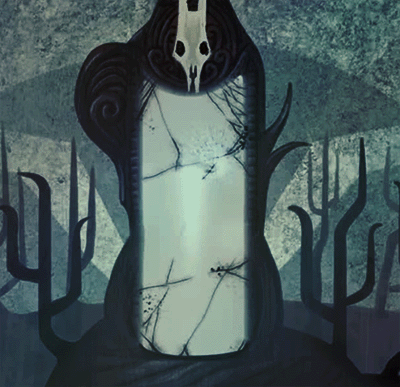
Therefore, a shattered eluvian seems to represent the destruction of a prison, in the same fashion it represented the escape of the Pride Demon in Merril’s quest [see that in the loadscreen gif above]
What the vinyl is telling me with the Shattered Eluvian and seven of them forming a flower, is that we are going to see the release of the Evanuris from their magical prison.
What have to do those trees in the illustration? It could represent the forest of Arlathan where Solas sealed the Evanuris in the city deep inside it. Another option is, that somehow, this prison is sustained/supported by Mythal, or was motivated by Mythal [probably with her death], since these trees seem to represent power, Titans, and Mythal at the same time. Trees are also related to the vhenadahl, which seem to hide a darker meaning that has nothing to do with what the Dalish or city elves believe about [more details in the section vhenadahl in the post “Red Lyrium Idol”].
Mythal as a motivator: If we take Solas’ words in the Elven Ruins, he sealed the Evanuris because they killed Mythal, but we also know in the Dev’s note from the mural “The Death of a Titan” that he really wanted to hide everything they were doing to no tempt anyone else to use this power.
Mythal as the last Guardian: We also know, according to Flemeth’s words in DA2, that Myhtal can exists in different places, as long as there is a “small piece” of her somewhere.
Flemeth in DA2 says:
“I’m a fly in the ointment. I am a whisper in the shadows. I am also and old, old woman. More than that you need not know”
“Must I be in only one place? Bodies are such limiting things. I am but a fragment cast adrift from the whole. A bit of flotsam to cling to in the storm”.
In DAI she says
“Once I was but a woman, crying out in the lonely darkness for justice. And she came to me, a wisp of an ancient being, and she granted me all I wanted and more. I have carried Mythal throuh the ages ever since, seeking the justice denied to her. [...] But what was Mythal? A legend given name and called a god, or something more? Truth is not the end, but a beginning.”
“I nudge history, when it’s requiered. Other times, a shove is needed.” [chuckles]
[Mythal came to me] ��for a reckoning that will shake the very heavens.”
Morrigan: And you follow her whims? Do you even know what she truly is? Flemeth: You seek to preserve the powers that were, but to what end? It is because I taught you, girl, because things happened that were never meant to happen. She was betrayed as I was betrayed - as the world was betrayed! Mythal clawed and crawled her way through the ages to me, and I will see her avenged! Alas, so long as the music plays, we dance.
When elven inquisitor asks her
Inquisitor: Why haven’t you [Mythal] helped us? We’ve called to you, prayed to you. Flemeth: What was could not be changed. Inquisitor: What about now? You know so much.... Flemeth: You know not what you ask, child.
Flemeth, about Kieran:
“He carried a piece of what once was, snatched from the jaws of darkness.”
So I think this also may show that Mythal’s retribution is coming. Flemeth has been doing a lot of mastermind work along the ages to give Mythal her deserving revenge associated with the destruction of the Evanuris that, it seems, Solas will perform [since he absorbed Mythal’s powers]. These words were always present in any path you pick, so they are key. Flemeth says that she will stay in this path as long as the “music plays”. This seems to refer to the music of the Darkspwan and the Archdemons that, thanks to Avernus, we know it’s linked, at the end, to something calling from the Black City too [read Songs and elements that sing and whisper in DA Lore and the last part of DLC: Soldier’s Peak]. What I understand is that Flemeth will not be in peace until the Evanuris are destroyed completelly. Which seems to have been Solas’ goal since forever, but lacked power to do it in that moment and he only managed to seal them and borrow some time [and power, since the orb was gathering Fade energy for a millenia]. This plan, of course, was ruined by Corypheus.
In short, considering Flemeth’s words about how shape is limiting, I wonder if there is a chance for Mythal to be in some shape or form, linked to the Golden City, in her Dragon Form, sealing the Evanuris. This hypothesis seems unlikely because Solas told us that Mythal died in some way. You can’t die and be a guardian at the same time.
However, here comes the last hypothesis I can muster: Mythal as the thing that was sealed in the Golden City, fused with the Evanuris. I think there is little to mistrust about the fact that the Evanuris indeed are trapped in the Black City, however, this illustration may imply that Mythal, in her dragon shape, is sealed there too. Considering Flemeth’s words, that sugest she is just a small fragment from the whole, cast adrift, and that can exist in different places at the same time, I wonder if Mythal, in a corrupted, draconic shape, belongs to the creatures that were sealed in the Black City. Maybe she is the ultimate danger, fused with the other evanuris, corrupted and mad by the Blight that “killed” her [when the Evanuris are hard to kill, according to Solas’ words in Somewhere[DLC Trespasser]: Elven Ruins]. This is a bit weird concept, to be fair, but I think that it tastes to “Bioware plot twist”.
The cover and the back
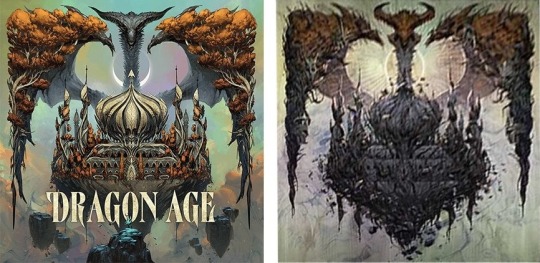
Let’s analyse the illustrations while constrasting these three hypothesis. They show two different versions of the same illustration, a non-corrupted and a corrupted one.
The front cover [details can be seen in this webpage ]: We see, in general, the Golden City with a Dragon behind, extending its wings onto the city, as if they were protecting it. I will call this image the “non-corrupted” version. Now, let’s go to the details.

Facts that can be seen in a better quality image:
The dragon is black or dark coloured with a blue accent. It has slightly curved horns and red glowing eyes [image 1]. From their wings, a dense golden-like canopy raises. In some parts of the drawing it looks like a golden vine spread all over the dragon’s wings [image 2]. Despite being in front of the source of light, the dragon does not cast shadows onto the city. The illustration seems to inspire the idea of “guardian” or “protection”.
The lower parts of the Dragon’s wings show branches that have no leaves, but look like single insect wings pending from branches [image 2, arrows]. Could this be related to the codex “Flowering Imago” from Ancient Elven codices; Vir Dirthara? I don’t know.
The area of the wings without branches shows a texture of red veins which can be perceived as veins of an animal as well as veins of a leaf [image 5].
Behind the dragon there is an Eclipse almost happening.
The cupule of the building shows small typical details of Elvhenan design that I talked and pointed out in the post Patterns and Styles: Elvhenan. The windows look the same design that the elvhenan ones [image 3].
The four spires that can be seen in the city are repeated upside-down, in shadows, implying this place may be similar to the Inverted Ward [image 4, arrows].
The gates of the building resemble strongly the gate of the Temple of Mythal, displaying a draconic image, similar to the statue of the dragon shape of Mythal [image 7].
The trees that rise and entangle with the building seem to be one with the structure, giving it more stability. This gives me the idea that the Dragon, related to these trees through its wings, keeps giving protection and stability to the city.
The whole city lays on a small floating isle.
In front of the isle, there is a tiny humanoid figure with a staff that displays the shape of one of the symbols of the Archdemons [image 6]. I talked a lot about this symbol in the post “The Destruction of the Veil“, linking it to Darkspawn and The Architect.
Around this figure, several birds or winged insects fly around [image 6, arrow].
The space around the city is bright and colourful, reinforcing the idea of a vivid city.
The back cover [details can be seen in this bigger image]. We see, in general, the Black City with a Dragon behind, extending their wings onto the corrupted city, as several faces with symbolic helms are fused in its wings. I’ll call this version the “corrupted” one.


Facts that can be seen:
The dragon is black or dark coloured with red accents. It has curved horns, and a second pair of horns protrudes from its jaw. It’s not clear for me if it has yellow glowing eyes or red ones [image 8]. These horns seem to have a resemblance with the Dragon version of Flemeth in DA2, but not in DAO [ but we know DAO engine was always poor for environmental telling and design details]. Flemeth’s hairstyle doesn’t resemble to any of these horns [image 8]. However, the strange tiara that Flemeth wears seems to coincide a lot with the horn structure of her Dragon shape in DA2 [the tiara has some curves on her temple that resembles the smaller horns in her dragon shape - blue and orange arrow-]. There is, of course, the meaningful yet mysterious central spike too. This spike, which relates Mythal with Andraste and other figures in DA lore, is not present in the corrupted dragon’s head. Considering how important this main spike is for lore, I believe that thinking in this dragon as Mythal may be a mistake [but then again, this is a corrupted dragon that may have suffered a transformation due to the Blight].
From its wings, a dense withered-like canopy dies. The corruption is deeper and more blackened the closer to the extreme of its wings. This corruption looks like black vines, but lacks of thorns. We know that thorny vines are related to the Blight since DAO games. We spoke about this in posts such as Murals in DAI: Basics.
Fused with the corruption of its wings, we see six heads, many of them with clear elven ears. All of them are wearing a helm with the symbols that we identified with the Old Gods / Archdemons in the post of the mural of “Red Lyrium Idol” and “The Creation of the Veil” [image 9].
The area of the wings without branches shows a texture of white veins, and in some parts of this darkened area, bits of orange that seem to imply something is burning inside this corrupted body. Looks like small peeks of Red Lyrium [image 11] or lava.
Behind the dragon there is an Eclipse happening, so the shadows projected by the dragon fall all onto the city. The Design of this Eclipse looks the same like the design of the (alternative) logo of Bioware for Dragon Age Dreadwolf [image 10].
The building is completely overtaken by these black vines, which destroy the infrastructure. It even destroys part of the isle where the city was built upon. We can see that these vines spread deep into it. The corrupted trees are not sustaining and reinforcing the structure of the building but attacking it. The Dragon “lost” its protective nature.
All these black vines remind me a lot of the strange Tentacles we find in the Fade of DAO [image 12]. They protrude from structures or the ground, and some of them even from statues. Maybe it was a concept related to the Old Gods when their design was more related to a Cthulhu creature with tentacles for feet. Check DAO screenshots in the posts The Fade - DAO and The Fade: The Undying Blackmarsh – DA Awakening
There is no tiny humanoid figure in front of the city anymore. However, the symbol that this figure had in their staff is the symbol we don’t see among the faces fused in the dragon’s wings [Image “?”]. This would mean that one of these creatures “escaped” this fate.
The colour of the space around the city is darkened, desaturated, and with “smoke” vein in the air, reinforcing the idea that this space has been corrupted deeply.
Speculations
The Dragon
The dragon and the dense vine rising along its wings, making it look like trees in the non-corrupted version suggests several potential representations:
1) This strong presence of the Forest theme in the dragon may relate this city to Arlathan, which was located in a deep, dense Forest entangled with the Fade, according to the comic The Missing. This would help us link Arlathan and the Golden City as the same place, since it has been very obscure in DA lore the whereabouts of the city of Arlathan. The only hints we have are the Tyrdda Bright-Axe Path, in which the man who wants to force Trydda in a marriage with him claims that whispers told him to conquer the Golden City at the North of their lands, which is a location where the Forest of Arlathan, and potentially the gone city, fit. The unreliable Dalish tales also claim that Alathan was sunk into the underground by Tevinter [details in Arlathan codices from Ancient Elven codices; Din'an Hanin– Elgar’nan Bastion]. There is no more pieces of lore or hints that explain the whereabouts of Arlathan.
2) The dragon seems to be a symbol that may represent Mythal. Another speculation is that this Dragon was Mythal, and the Golden City [maybe Arlathan], may have been her city or the city where her fate was sealed.
According to the unreliable codex [The Temple of Mythal], it seems to be an archeological fact that the Elvhenan used to have a main Temple surrounded by a city developed around it. We know the Temple of Mythal lays in the Arbor Wilds, and we can see some ruins that may fit the idea of a “city/town” before reaching the central part of it [see Temple of Myhtal - Part 1], so the hypothesis that the Golden City was Mythal’s main city seems discarded. However, we also know that Mythal may have had many cities and the biggest ones among the Evanuris thanks to the codex "Song to Sylaise” from Ancient Elven codices, Temple of Mythal.This city can be one of the many that belonged to Myhtal as well as the place where her fate was sealed.
3) This dragon may represent one of the ancient gods that the Elvhenan worshipped before becoming gods themselves. This city also may have been the temple of an ancient dragon that the Evanuris worshipped in the begining [according my interpretation of the Elvhenan lore, explained here], but it is hard to speculate further. There is no much lore but some visual hints on this matter.
4) If it is the city where Mythal’s fate was sealed, we can imagine that the Evanuris, desiring Mythal’s natural Dragon shape, may have invited her here and may have made experiments with her [as we know some Ghilan’nair’s experiments were performed in Tevinter Nights: The Horror of Hormak, that may include some fusion of animals in order to modify their shape]. Let’s remember that the Evanuris were related to winged shapes, “a shape reserved for the Divine and their Chosen” [from the codex Ancient Elven Writing]. If this is the case, the corrupted version of this dragon may represent Mythal, corrupted, and also, displaying her recknoning upon the city, where the other Evanuris were sealed by Solas. She and the others are fused in the corruption itself released by this hypothetical experiment.
There is also a chance that Mythal, in her dragon shape, is still protecting the city, trying to contain the spread of the Blight thanks to the natural Blight-resistance that Dragons have. This concept is only inspired by Flemeth’s words about hinting the fact that she can be in many places at the same time, and bodies are limiting things [there is also a strange hint in the old quest of the Blackmarsh, where a demon in human shape could be in the Fade while a dragon-like shape related to it could be in the Waking World, details in The Blackmarsh and the High Dragon]. Maybe some pieces of Mythal were spread in the world to preserve a bit of her, while her [corrupted] Dragon form remained sealed with the evanuris or maybe she is a guardian of the corupted city. Flemeth also claims to an elven inquisitor that Mythal “changed”, and according to the corruption version of this illustation, Mythal may have changed, and acquired a more menacing looking, as her horns changed too and lost her central spike, such an iconic element in her design.
The inner side of its wings are consumed by the Blight, but the top external side is still resisting. So, the dragon resists the Blight, protecting or isolating the city even though the dragon’s horns changed, and it is “a different/corrupted” dragon. To me this double image represents what the mural “The Creation of the Veil” implies: the Black city, for an unknown reason, has 7 gates that could not be closed and were protected by creatures that could resist this corruption as long as possible: 7 dragons. This idea is a bit supported by the fact that Flemeth always tried to protect Urthemiel’s soul by teaching to Morrigan to protect “what was once” and telling her to have the baby. Urthemiel cannot be an Evanuris that killed Mythal [remember that Mythal wants revenge for that betrayal]. And Urthemiel is a dragon, as we saw him in his Archdemon form, and Mythal/Flemeth is also a dragon, so maybe she is part of the group of these dragons that were powerful “ancient gods”, potentially worshipped by the Elvhenan in the beginning until they got their own divinity. From that moment on, these dragons became the Forgotten Ones, chased by Andruil to the Abyss, and later, worshipped by the Tevinter as “Old Gods” that reside underground. I explained a bit this idea in the post Attempt to rebuild Ancient Elvhenan History.
5) This dragon maybe is not Mythal, but another archdemon, or maybe the mysterious 8th Old God. I never know what to do with that bit of information: the codices of the astrarium imply the presence of an 8th old god dragon that makes no sense to introduce in the lore so late [Constellation: Draconis]. Is this dragon related to this illustration? I don’t know.
As a detail, the wing veins in the non-corrupted version are red, and I am not sure we should understand them as veins of red lyrium. Because, first, it makes no sense to have red lyrium inside a dragon's body in a version which is not the corrupted one, and second, if it were the case, it would imply that Dragons, [these ancient dragons] used to have lyrium instead of blood, which would relate dragons to Titans as the same creatures. And despite the fact that the lore seems to show some similarities between these creatures when it comes to their powers of manipulating Reality or being underground, sleeping, it seems extremely odd. It’s too big of a concept inside the lore of Dragon Age to take it lightly, because it would imply that dwarves are “dragon children”, and things will get more confused when thinking in the “crafted race” of the Qunari.
The two versions of the dragon indeed look like different ones. I’ve been speculating long ago that, so far we can gather from comics and codices, the Elvhenan, in particular the Evanuris, were looking for means to obtain Divinity. The Dragons seem to be extremely old, and ruled the skies when “everything sang the same song” [Yavana’s words]. We can also suspect that the Great Dragons had somniari powers, meaning that they could change reality through the alteration of the Fade [The Silent Grove, Those Who Speak, Until We Sleep] and mortals could attain some degree of this power via their blood. On the other hand, we find in the last comic [The Missing] a mural of potential Evanuris wearing dragon-like outfits. This fits with the old codices of the Elvhenan we found in game, where “divinity was related to the shape of something with wings” that we can assume it’s a dragon. We have several hints pointing to us that maybe, the Evanuris, when they were generals and mages, worshipped “ancient gods” that were Great Dragons, until they found a way to manipulate their own shape to become dragons themselves. Maybe here the Titans appeared as the means for this transformation [in The Horror of Hormak we see that this process of fusing shapes include crystals that seems to be made out of lyrium, maybe these are the Titan’s heart?]
We know that Evanuris did something terrible with Titan’s power that forced Solas to hide all that monstrosity, collapsing the Deep Roads in order to avoid anyone attempting to reach that power again. The codex associated with this event may transpire hints that can be related to a terrible thing being unleashed that may have killed Mythal [or maybe corrupted her? Details in “The Death of a Titan”]. That could be the Blight, or the red lyrium, or something worse that originated these two diseases.
We also suspect that the Forgotten Ones and the Evanuris had been at war for a long time before the Titan War, so how did the Forgotten Ones fit in the reconstruction of this past? It’s hard to say with precision, but some bland and weak hints may imply that the Dragons that have been leading Blights are, in fact, the Forgotten Ones [the only weak proof we have about this connection is through Hakkon/Geldauran in Elvhen Tomb]. This means that the Forgotten Ones may have been dragons [or more likely Great Dragons] and not elvhenan, and, when the Evanuris released the evilness that they created [probably The Blight], it was the Forgotten Ones [naturally resistant to the Blight, read Josephine’s result in Learn More about Dragons] who became the protectors and the means to isolate that disease from the rest of the world until finding a solution.
The Eclipse
Eclipses are associated with Fen’Harel and the events to come, according the codex The Emergent Compendium: an ancient magical tome that produces images and text on its own [DA2]. One of the pictures it manifested was described as "Two shadowed spheres among stars", and it was accompanied by a subtitle that could be deciphered into the phrase "An eclipse as Fen'Harel stirred." [I talked a while ago about how "stir” seems to be used mostly to describe the movement of Titans in DA lore, so the word choice is quite peculiar here, details in “The Destruction of the Veil“].
Eclipses are also related to the dynamics of sun-moon hidding each other or projecting shadows over the other, which may relate Mythal [unreliably related to the moon, according the Dalish Tales/codex Mythal: the Great Protector] and Elgar’nan, who has several unreliable Dalish tales in which he “hides” or “shoves” the sun down into the earth. The concept that the Sun is hidden somehow is repeated in small details along the lore of these gods, even though all of these tales are extremelly unreliable in my opinion. It’s hard to appraise the grain of truth they must have.
If the Sun is related to Elgar’nan, and if the moon may be, somehow, related to Mythal, then, a [solar] eclipse is the moon [Mythal] overtaking the figure of Sun [Elgar’nan?]. The fact that Elgar’nan is associated with vengeance, while Mythal to justice but also revenge, seems to weakly push us in this direction when we remember that Mythal took the place of Elgar’nan as judge of the People.
Let’s open a parenthesis here and refresh details before we continue further:
Mythal has always been a goddess of the Revenge as well, according to Solas in the scene of Altar of Mythal, which places Elgar’nan in a curious and questionable role. Elgar’nan was always related to fury, vengeance, and brutality. And we also know through the codex of The Judgment of Mythal, that she took the place of Elgar’nan as a judge of The People to avoid his fury which destroyed everything it touched. Considering this, it seems that Mythal has been shifting into a more “Elgar’nan”-like shape.
I can’t say Elgar'nan and Mythal are both the same entity, since the old codices of the Elvhenan present in the Temple of Mythal show two different Evanuris. However, the many aspects where Elgar’nan and Mythal overlap, the lack of much more iconography for Elgar’nan as the big “father” of the Elvhenan pantheon [which makes us suspect he was a really powerful Evanuris, probably compared to Mythal], and the repetitive concept of split personalities that some Evanuris seemed to have, make me play with the idea that Mythal and Elgar’nan are the same. After all, Mythral has different representations on statues: as a dragon, as a humanoid, and as an elf in mosaics [check Evanuris]. This is not a peculiarity of hers alone; Fen’harel also has 2 shapes: the elf and the wolf. And we also have the very vague case of Dirthamen and Falon’Din who seem to have different shapes but sometimes one takes over the other and it’s very unclear what’s the true nature of their situation: a lot of this has been speculated in Humanoid Dirthamen and in The Lost Temple of Dirthamen - Part 1-Part 2. Besides, Solas always warned us that the nature of Mythal was more complex than we can truly understand [read Temple of Mythal, Part 1, Part 2, and Solas sharing Lore: Part 1 - Part 2].
I’m not saying Elgar’nan and Mythal are the same [I don’t truly believe it yet], but sometimes I play with the idea, considering how little ancient art we have about Elgar’nan and how much of it is related to Mythal. If we think in Emerald Graves: Din'an Hanin, the place is called “Elgar’nan’s Bastion”, and even though the place has been altered by ancient Dalish, and there are plenty of statues that seem odd to be there [like the many Andrastes spread in the main hall], we still find many of Mythal’s presence in a central display. Now, this may be consequence of the ancient Dalish or may have been there long time ago before them; that we don’t know. We also have the mysterious Strange Idol [analysis] deep down in the tomb of this Bastion, surrounded by Mythal’s dragon shaped statues. It’s also true that these dragon-statues seem to be defensive devices as the scene with Corypheus entering the Temple showed us.
Another detail that always got my attention was that the mosaic of Elgar’nan, which I spoke about in Evanuris, shows a non-elven limb. His arm has the shape of a wolf’s or a “dragon’s” arm, with big claws, shoving down the Sun. We also know, thanks to Flemeth’s words, that bodies are “limiting things”, so Mythal maybe has been adopting different forms along her life or depending on the role she had to perform. This idea is very weak, supported barely by details that, I personally, don’t consider super strong, but still yet I think it’s worth commenting that maybe there is something going on about these Evanuris. Maybe we have, at the end of the day, less Evanuris [maybe four plus Fen’Harel?] than the ones we thought [eight plus Fen’Harel] simply because many of them were split in the Tales due to their different roles along their lives?: Falon’Din and Dirthamen as one, Ghilan’nain and Andruil as one, Elgar’nan and Mythal as one, and by discarding enumeration, June and Sylaise as one. Geldauran speaks only about Andruil and June [check Elvhen Tomb]. Solas speaks dismissingly about Falon’Din and Andruil [Temple of Mythal, Part 2]. How is it possible that Elgar’nan, as the “father” of the pantheon, and therefore probably one of the most important/powerful Evanuris originally, ended up being such a forgetteable figure in the art and places we found? It’s another mystery to me.
Anyways, this whole paragraph is an idea that has been flying around my head for a long while, and to be honest, I’m not super convinced about it. It seems very weak and baseless, even though there are some details that keep making it annoying to discard completely, specially if we take into account how fluid shape was among the elvhenan.
So, with all these details in mind, the eclipse as a concept of moon taking over the Sun could represent mythal changing or taking over Elgar’nan’s figure? Or it’s Mythal all along, but Elgar’nan is the corrupted or angry version of her, while Mythal is the gentle mother and what was left of her? Mythal, after all, changed; and could not help The People anymore. Something happened that was never meant to happen [Flemeth’s words]. However, I doubt this because the split is previous to her assasination.
Closing the Parenthesis and returning to the Eclipses: It is also true that eclipses are associated with darkness because they tend to block [the solar eclipses] the light of the sun. So the constant reiterative comment of the darkness in the Chant of Light or in Elvhenan codices may have a double interpretation: as the darkness=Blight but also as an allegory to the darkness that comes with an eclipse. To this point in the lore, and considering the last videos/trailers we were given, it’s clear for us that Eclipses are omens of something big that will happen.
If we allow the interpretation of an Eclipse to be a bit more laxed, we can also see it as an overlap of different spheres, and there is a common yet vague symbolism in these games and recent trailers about “spheres” that may be related to eclipses too. Let’s numerate them just to have all of them in one place:
Mythal: the Great Protector: Unreliable Dalish tale, where we read that Mythal created a “pale sphere in the sky” which is one of the two moons of Thedas. This seems irrelevant but for completion’s sake I add it to this list.
The Emergent Compendium: I’ve refered to this codex in the begining of this section. It’s an ancient magical tome that produces images and text on its own, presented to us in DA2. One of the pictures it manifested was described as "Two shadowed spheres among stars", and it was accompanied by a subtitle that could be deciphered into the phrase "An eclipse as Fen'Harel stirred." It seems to relate Fen’Harel with an eclipse or the overlapping of spheres.
Veilfire Runes in the Deep Roads, requeires Veilfire to read: There is smell of blood followed by the image of green vines growing and enveloping a sphere of fire. A sphere of fire can be interpreted as a Sun too. The “original fire/sun” was sealed in a sphere, protected with vines. I spoke a lot about this “sphere of fire” in Murals in DAI: Red Lyrium Idol and The Death of a Titan. A lot of more speculation in Ancient Elven codices; Vir Dirthara, and how the “sphere of fire” also leaked into the Andrastian faith in Andrastian Design: Stained Glasses. This particular sphere of fire seems to be important now, specially with the visual design of red lyrium and trailers of creatures or trees burning from the inside that Bioware shared with us lately. This sphere seems to be a container of something furious and destructive.
Raising the Sonallium tells us that there were thousand of elves maintaining a spell to pull raw essence from the Fade into a sphere in order to create pocket worlds, “planes in-between”, like the Crossroad. The sphere in this codex has a temple, in rust-red jungles with waterfalls. Spheres here are presented as we saw them in the mosaics of Fen’Harel, in Ancient Elven codices; Fen’Harel’s mountain ruins. This sphere seems to be a container of a world or another plane of existence.
Old Elven Writing gives us the image of two overlapping spheres; “unknown flowers bloom inside their centres”. We know that these spheres can be representations of pocket worlds, according to the previous codex in this list. Overlaping spheres can be also interpreted as an Eclipse. Flowers blooming inside is a bit odd. We didn’t see lore related to this image. If we see the banner of the Elvhenan [the brown banner I showed in Somewhere[DLC Trespasser]: Elven Ruins], they have a pattern of flowers, but this seems to help little. However, flowers may be related to the reiterative symbol of the vines. In a laxed way, this image brings to me a distant relationship with Vir Dirthara: A Flowering Imago, which is a codex that always got my attention due to its oddity and rebel nature to find a proper interpretation within the context of DA lore. I talked about it extensively in Ancient Elven codices; Vir Dirthara.
Murals: In Solas’ murals, we see the representation of the Fade and the several barriers crafted to isolate the Black City as [sometimes red] spheres too [details in Murals in DAI: Basics and in “The actions of the Inquisitor”]. The Red sphere is always the one related to or encapsuling the Black City. In the mural “Red Lyrium Idol” we see Solas figure walking inside or on the sphere that may be on fire. In this last mural, it feels like he will face and deal with the danger that was contained in the “fire sphere” long ago.
As a final note related to Eclipses, I think it’s worth noting that the DA lore also has some details about the stars and the historical meaning of astronomy in few codices. Eclipses are events related to celestial bodies, so stars and skies must also have some significance in this lore. Trying to find this link, I found two codices that give us a bit of more context related to the inminent Eclipse that will happen and that will bring a deep, chaotic change.
Notes on the Stars: is a codex found in Fallow Mire. It seems to imply that the sky has been shifting and changing slowly [”Looks like different sky“] Although its interpretation may be left open, considering the fact that the sky is different in different hemispheres. However, I’m not sure Thedas is spread along different hemispheres but extended all just in one: the south hemisphere [Even though we don’t know the planet where Thedas exists, I suspect it is located on the South Hemisphere of the said planet: warmer and tropical to the north, and colder and icy to the south; which is how climate works, in broad lines, in the south hemisphere of a planet with a day-night cycle like Thedas]. So, in theory, that the sky is changing is not a comment to take as irrelevant, but as a piece of enviromental information which is telling us that the sky is changing and therefore, something big is going to happen at a global scale.
Astrariums: This codex gives us the unvaluable information that cults previous to the Andrastian conversion of Tevinter were deeply against the Magisterium system and wanted to be ruled by Dreamers. We also learn that the Sidereal Magister were related to astronomy thanks to this codex, since all of them were Dreamers too. Also, the word Sidereal makes sense now; “of or relating to the stars or constellations”. Maybe this is associated with the idea that “the dragons ruled the sky” [The Silent Grove], so Tevinter tried to approach their dragon divinities by studying the constellations.
These two codices give us a bit more of information about the importance of the sky within DA lore, and how the incoming Eclipse may be changing things already.
The Tiny Figure
The figure with the staff is a mystery to me. I can link its staff’s shape with several things:

from The Architect [items sold by the Nexus Golem in DA2] and a broad faction of mindless Darkspawn [darkspawn decorations in DAO], to a Great Dragon/Forgotten One used during the creation of the Veil [details in the mural “The Destruction of the Veil“ and in “The Creation of the Veil”]. This symbol is also present in one of the Fen’Harel’s mosaics, in Ancient Elven codices; Fen’Harel’s mountain ruins, from which drops of lyrium fall and a lot of speculation has been done around it. These small details keep telling me of the potentiality of relating the Titans to the ancient Great Dragons that slumber underground. We know that both creatures have the power to change reality through different means, although both have totally different kind of blood [dragon blood vs lyrium]. However, we also know that Evanuris exploited Titans, and Mythal [a dragon] may have learnt “something else” from them.
First speculation: The figure is Solas, and the symbol is Fen’Harel’s
The tiny humanoid figure is in front of the city in the non-corrupted version, while it is not there anymore in the corrupted one. Curiously, the symbol of their staff is the symbol we don’t see among the faces fused with the dragon’s wings, so I suspect it means it was the “Evanuris” that "made it", an Evanuris that escaped Fen’Harel’s banishment. Hence my suspicion that the figure could be Solas himself and that symbol Fen’Harel’s or Mythal’s. However, I think it’s impossible for this symbol to represent Fen’Harel: Solas is not a Dragon, he never was one, and his rejection to Divinity is present in most codices we explored. He did not take the divine shape of a “winged thing” [his shape, actually, has always been of a wolf, recently made “draconic-like” due to the absortion of Mythal/Flemeth’s powers], and he also was always Solas in the way he is now [Solas’ own words], so he was always a creature related to a wolf of six eyes that, probably, took the shape of an elvhen due to Mythal’s request [read details in “Solas’ Nature” in Solas sharing Lore: Part 1 ].
The most logical concept to explain that figure should be Solas, appreciating the city and the magnificent dragon [Mythal] he has praised in game a couple of times, before isolating it when the Evanuris went too far and corrupted it. But it’s a speculation without any proof, to be honest. And the fact that all these symbols in the helms of the elvhen fused with the dragon’s wings were dragons [read “The Creation of the Veil”], makes this hypothesis less likely. Solas was never related to a dragon shape, so these C horns could not represent Fen’Harel [we have suspected that all these symbols are related to Archdemons/Great Dragons thanks to the unmistakable symbol of Urthemiel, check “The Creation of the Veil”]. We also have to remember that this C-symbol is also used by Darkspawns, and Solas is even less related to them. With this idea, the mosaic of the creature bleeding lyrium is also nonsense: Solas has not lyrium blood, although his wolf shape has been painted once with eyes that may represent lyrium [I explained this detail in “The Destruction of the Veil“].
Second speculation: The figure is Solas, and the symbol is Mythal’s
The other speculation I can make is that this C symbol represents Mythal herself. Part of this symbol appears in the horns of the corrupted dragon. We know that Evanuris killed Mythal [but we suspect they did something worse to her since “Evanuris do not die easily”], and that may be represented in the mosaic of Fen’Harel with that figure bleeding lyrium [this, again, puts us in the uncomfortable position of making a comparison of a titan with a dragon; however, we know Mythal got something powerful from the Titan she killed in “The Death of a Titan”, and maybe this power is represented with the lyrium drops in such mosaic]. We know that Solas respects her enough to, probably, carry a staff with her symbol, and allow a representation of her assasination in the series of mosaics in his pocket world [Fen’Harel’s mountain ruins] to keep memory of what the Evanuris did to her.
How does this interpretation explain the symbol carried by the Darkspawn? It’s true that the darkspawn keep hearing a song in their heads that, thanks to Avernus [ Soldier’s Peak], we know it comes from the Black City, even though it feels like it’s from the Archdemons. If we still try to stick to this interpretation, we are getting close to assume that Mythal, in her dragon shape, is still in the Black City, corrupted, maybe even fused with the rest of the Evanuris. So these symbols carried by the Darkspawn have always been representation of Mythal, who keeps singing a song with the other Evanuris from the Black City through the Archdemons to the Darkspawn. This idea seem to resound a bit when we remember Flemeth’s words: she is a fragment adrift in the storm, and she keeps doing whatever she is doing [we dance] “as long as the music plays”.
We also have the curious and forgeteable long quest of The Blackmarsh and the High Dragon in DAO which, despite being cryptic, can have an interpretation that makes us aware that in Thedas, there are means to have doble shape, and one of them, as a dragon. Of course, this is a mere obscure hint that shows a potentiality. It’s far away from being a clear canon concept still.

But returning to the interpretation of seeing this dragon as Mythal, there is more than one flaw in this interpretation: We have enough art of Flemeth to suspect her symbol is not this C-Symbol [read details in “The Destruction of the Veil“]. However, I noticed again that the corrupted dragon seems to have a similar shape of “horns” than the ones we saw in Flemeth’s art in the cutscenes of DA2, but still missing the iconic central spike. So, as we can see, the interpretation of this C-symbol, and the tiny figure is very, very obscure. None of the interpretations seem to fit every detail.
What we can link with some degree of certantity is that, now, this C-symbol makes sense to be present among the Darkspawn, since it seems to imply that this is the corrupted dragon/creature that has been "singing” throuhg the Blight and archdemons into the head of all blighted creatures. This corrupted dragon, whoever it is, resides in the Black City, maybe even fused with the Evanuris, probably victim of a process similar to what we saw in The Horror of Hormak [read the process explained by Jovis]. After all, Avernus [Soldier’s Peak] always told us that the Archdemons were not the true source of the song, but something inside the Black City itself.
Art pieces in the vinyl book

These vinyls come within a “book” where each of them is placed in a double-sheet/envelop page. Each of these pages shows a very stylised image. We proceed to analyse each of them.
Update on Dec 2023: Here, someone compiled all the images, and can be seen a lot better.
First Image: The Gray Warden Image
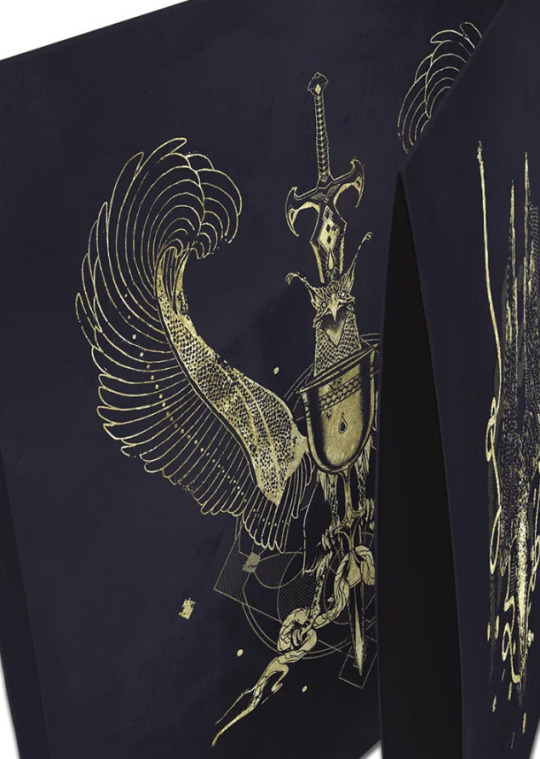
This seems to represent a griffon. It’s an uncommon Grey Warden’s symbol, since I didn’t see it anywhere before. However, the presence of the chalice with a symbol of a drop of “black” blood makes it unmistakable.
The sword that pierces the griffon’s neck also has a drop of blood, but it seems to be a white drop. Maybe this is related to the concept we learnt in the book Last Flight: as a last resource during the Fourth Blight, the Grey Warden started to force their griffons to a process similar to the Joining, but they didn’t handle the corruption well. Madness spread among the Griffons and most of them had to be sacrificed. This was the reason why the griffons went extinct.
The dagger that the griffon carries in its talons seems to pierce or be surrounded by something long and white that looks like tendrils or a snake with small branches, or a vine [which usually represents The Blight]. It’s not clear.
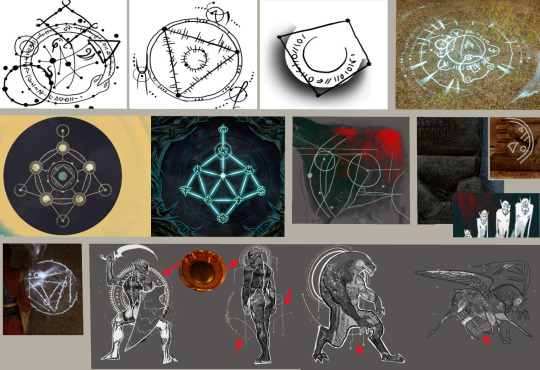
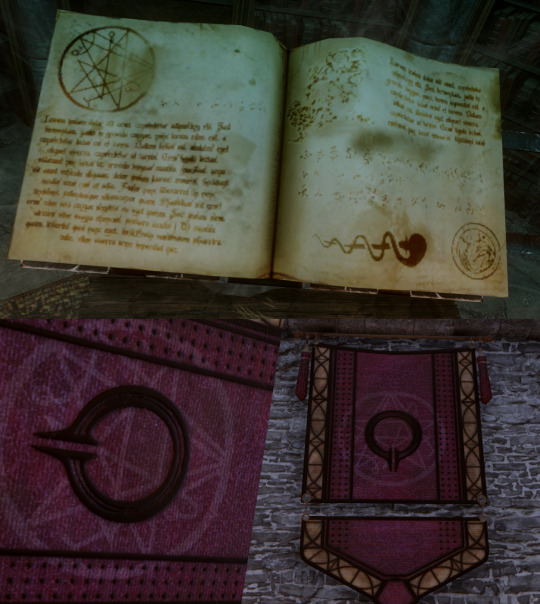
On the background, there is a symbol that looks similar to the ones we saw for glyphs or for mage organizations such as the Circle. So far, I could not find the one matching this.
I think it’s clear that this vinyl will contain the music related to the game DAO due to its strong relationship with the Gray Warden symbols.
Second Image: The Hawk and Kirkwall logo
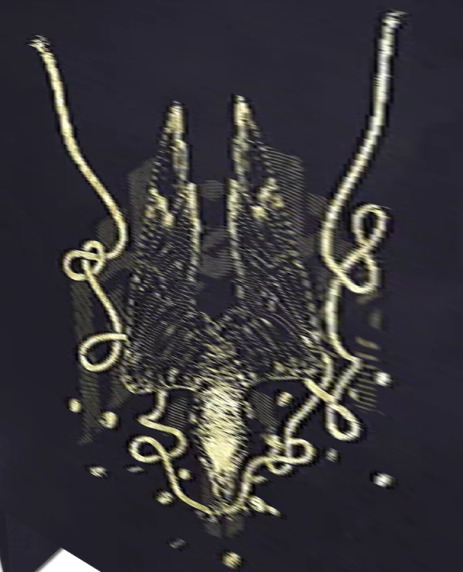
Twitter user Kiranox (@/veranox) was able to do some photo manipulation and have a better image of the second and third one despite the perspective.
As @felassan has pointed out, this symbol displays two unmistakable old ones:

The Hawke falling onto its prey, and the Symbol of Kirkwall on the background.
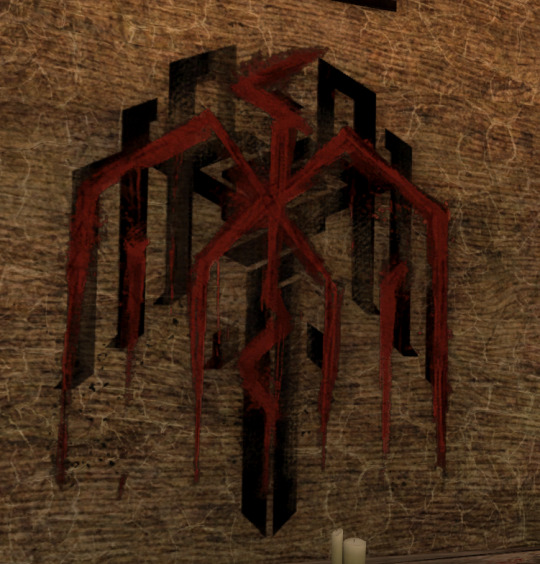
It’s curious that, in this vinyl illustration, both images are overlaped, as if they were trying to tell us that this geometrical symbol is a Hawk, when we know that, historically speaking, it was a rising dragon, from the time Kirkwall was called Emerius [more details in the post Kirkwall history and design].
When we have this image in high quality we will see it better, but the white figure also looks to me like a hawk falling free, and I can’t stop thinking in relating this to Flemeth’s words: "A word of advice, we stand upon the precipice of change. The world fears the inevitable plummet into the abyss. Watch for that moment… and when it comes, do not hesitate to leap.” Her cryptic words were always interpreted by me that the world needs Hawke to stay in the Fade. Soon, Fade and Waking World will join again, and maybe what Hawke did in the Fade until their death will be extremelly useful and key in the world that we are going to face in DA4.
This symbol also has what looks like a rope in a messy way, maybe even falling free too, with a knot in one side. The only symbol similar to this that I can relate to is Sylaise’s vallaslin, which looks like snakes or ropes in messy ways, but I don’t think there is any link between these. Is this image telling us that this is Hawke leaping into the abyss with a cut rope, and therefore, no way to return?
What I think it’s clear is that the vinyl placed in here will be related to DA2′s music due to its strong relationship with the hawk and Kirkwall symbology.
Third Image: The diagram and the hexagonal shape

If we continue this logic, this image should be a symbol representative of DAI.
What I see repeated several times here is a pattern of 6 circles, 3 of different colour and alternated. Inside of the central circle we have another set of three filled circles. This repetition of 3-circles is not something I can say I’ve seen in DAI. In fact, I’m nor really sure to what associate it with. If these were a Quincunx, we would have a lot of speculation to make since it’s a symbol present in Thedas since DAO.
These six circles are inside an hexagonal shape, which is deeply related to Tevinter, as I described in details in Patterns and Styles: Tevinter. It has a potential to be related to focis, that potentiated the power of the dreamers or priests to communicate with their dragon gods.
This design also looks similar to the diagrams that faintly appear in the background or on the body of some creatures that I talked about in Nation Art: Elvhen. However, none of them fits perfectly.
It is likely that this vinyl will countain all the music related to DAI due to the symboly of magical diagram and the presence of the Tevinter hexagonal shape.
Fourth Image: The diagram and the spheres
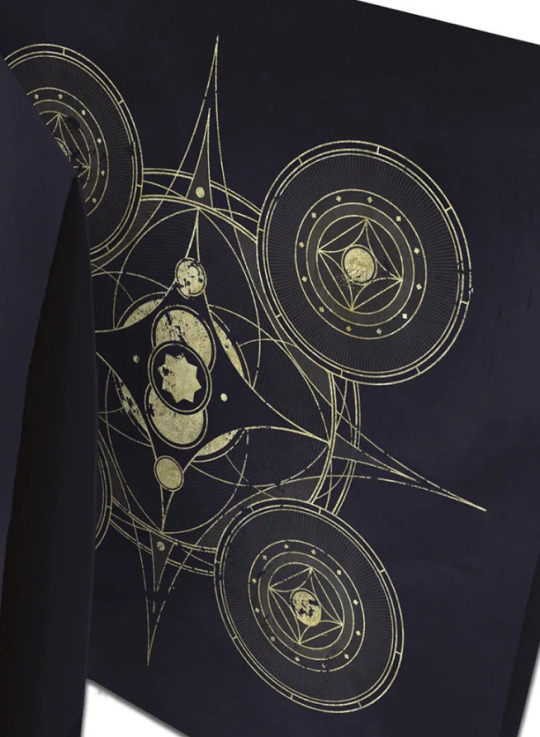
This is probably a mixture of all previous games with some pieces related to the incoming game of DA4.
This figure, in general, shows a Quincunx, where the central part are the three overlaped circles with a sun or a star inside.
I don’t think it can be related too much to Solas’ tarot Card [which is related to Orlesian decoration of the Winter Palace, as we can see a rug with the same kind of Quincunx symbology on it in the book of Art of Inquisition [below].

Again, as I said in Patterns and Styles: Orlais, a lot of Orlesian design and art seems to be strongly influenced by the elvhenan, so maybe this symbol has a particular meaning to the Elvhenan, but so far, I can’t think much of it beyond the fact that it is a Quincunx.

If Anything, that tarot card is showing the Quincunx symbol in itself, with Solas being the central, and therefore, the important thing. Just because these symbols have a clear Quincunx in them, one could relate the three spheres and the star in the vinyl illustration to Solas. These three spheres look like overlaping one that has a “sun”, so the meaning of an eclipse seems to be implied. And we know that Solas, in his Fen’Harel representation, is related to an ominous Eclipse, according the The Emergent Compendium I spoke about in the section “The Eclipse”.
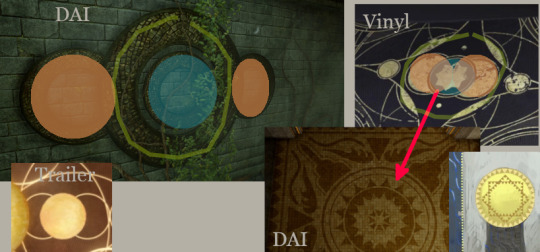
Let’s talk about these three spheres and the star present in the vinyl: The star has the same shape to the central star we see in Solas’ mural when he draws the Temple of Mythal in “The actions of the Inquisitor”. This strengthens the hypothesis that the dragon we see in these illustations may be related to Mythal in her dragon shape.

I’m not sure if this symbology of three spheres overlapping has something to do with the mysterious symbol found at Emerald Graves: Din'an Hanin. In it, we see three golden ring of the same size, aligned. The central one is surrounded by a bigger ring, which seems to be similar to the image we see in this black-and-golden illustration: Three spheres [blue and orange ones] with a bigger ring [yellow line]. In fact, it looks like a progression: The first stage is the one shown in Emerald Graves: Din'an Hanin, where the two orange sphere approach and try to overlap the blue one, which is inside a bigger ring. The second stage is the orange circles overlaping half of the blue one [this is seen in the trailer too], and the last one is this vinyl illustration, where we see that the three spheres are inside the bigger ring and we see the middle of the blue sphere: a sun or a star, or maybe a “sphere of fire”. I talked a lot about the concept of the “sphere of fire” in Murals in DAI: Red Lyrium Idol and The Death of a Titan. A lot of more speculation in Ancient Elven codices; Vir Dirthara, and how the “sphere of fire” also leaked into the Andrastian faith in Andrastian Design: Stained Glasses.
This Star [made of eight points] is the same one that we see in the mural of Temple of Mythal, but it’s also very similar to the yellow mosaic I talked about a lot in posts such as: “The Death of a Titan” and in the tag asterisk symbol. This links Mythal with this star, which can potentially be related to the heart of the titans and this mysterious power the Evanuris discovered aside Lyrium.
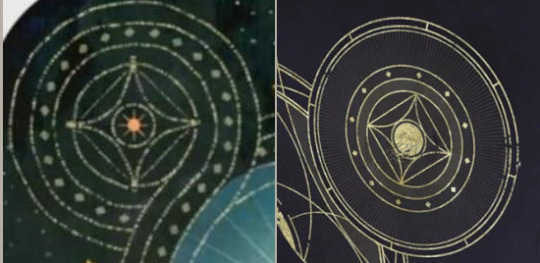
Why I don’t give to much thoughts to Solas’ tarot card? Because it’s a general Quincunx which central important element is Soals himself. Similar Quincunx symbol appears in this vinyl illustration. In fact the circles that compound this Quincunx are very similar, but those in Solas’ tarot card’s present a series of small icons: a moon, a sun, undulating lines, and four dots.
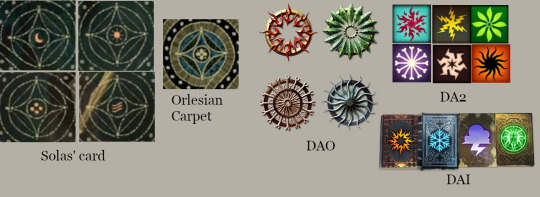
We can assume that they may be related to magic, but so far we saw in DAO, DA2, and DAI, all these symbols come from the Circle, and therefore most of them keep recreating the Chantry icon, or are inspired in it: all of them are very close to the design of the sunburst. The Orlesian carpet has a small flower in it, which is a very typical icon present in all orlesian design.
But Solas’ tarot card has four clear symbols:
We can agree that Sun/Moon may have some relationship with Mythal/Elgar’nan, since there is information that relates them, but sadly the only source we have for that is the Unreliable Dalish Tales, so it’s hard to be sure. These both symbols are also related to the Eclipse symbology that, at this point, we can’t deny as related to Fen’Harel.
The undulating lines have been associated with “shape and control” according to the info I gathered in “Murals in DAI: Basics” in the section “Undulating lines associated with Vallaslin or/and bound-slavery”.
The dots, so far I remember, were never seen in any game. I can only relate them to these four-petal flowers in the Orlesian design, but since we are talking about Elvhenan, it must have come from an older symbol. Maybe it’s something related to the Forgotten Ones or the Titans indeed, both groups quite unknown in the lore still. The other posibility to understand these four dots is to represent a Quincunx symbol without the middle dot.
#old gods#dragon#Quincunx#evanuris#mythal#tarot cards#eclipse#Golden Ring#fire sphere#sphere of fire#Bull horn head creature#forgotten ones#Dreamers#elvhenan#codex focused#High speculation
37 notes
·
View notes
Text
[Review] Darksiders III (PS4)

Great-siders.
After the development of Darksiders II, Vigil Games shut down, tied up in the bankruptcy of THQ. A successor studio emerged in the form of Gunfire Games, whose first task was the next-gen port/remaster of DS2. After a few original titles they then pitched THQ’s successor THQ Nordic on a true sequel. With a slight shift in both development staff and the game’s genre and inspirations, I reckon they finally nailed it.
While the first two games combined Zelda’s puzzling and dungeoneering with character action combat, this one sits firmly at the feet of From Software’s Soulsborne games. The combat is now deliberate and punishing with an increased importance on dodging and countering, albeit more fast-paced and flashy. The “soul retrieval” mechanic, the exploration/shortcut/checkpoint loop, and the upgrade economy are also familiar. Meanwhile puzzles and platforming are mixed in, in much the same way as Respawn’s Jedi: Fallen Order handled things, and with similar success (despite much less budget, I’m sure).
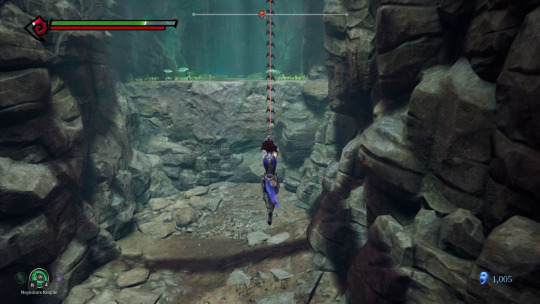
Fury is even lighter on her feet than Death, springing around with her signature whip and double-jumping by default. But the whip can transform, and the new elemental mode system enables both new weapon types and movement abilities to find new paths and hidden goodies in the sprawling, inter-connected game world. I favoured the Flame Hollow for its triple-jump and quick claws (each of the four modes, unlocked gradually over the game, has a default weapon type and a second one found in a DLC zone which expands on the modes’ puzzle potential).
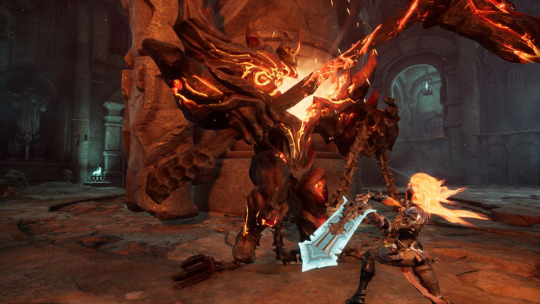
The writing and story in these games has been so inconsistent that I had to look into the situation. Comics writers Joe Madureira and Joe Kelly were responsible for the undercooked first game, with THQ ringers Paul DeMeo and David Slagle brought in to script the second with positive results, while Madureira presumably oversaw things to some extent as studio creative director. With Madureira not in the picture anymore—although he has relatives credited on this game and Genesis—the story duties were outsourced to Man of Action (co-founded by the same Joe Kelly), the creators of Ben 10 and other children’s cartoons and comics. They are capable of stories pitched a little older though, as evidenced here.

Fury is a fun protagonist, a hotheaded and aloof firebrand who actually has an arc and becomes more reflective and purposeful by the end. She plays off a female equivalent to Mark Hamill’s Watcher character from the first game, who seemingly simps for Fury until her sudden but inevitable betrayal. Ulthane the ogre-man also returns from the first game as a protector of humanity, among other decently well-drawn side characters and series mainstay Vulgrim the mercantile demon, who acts as your bonfire proxy. The villainous faction are chaotic personifications of the Seven Deadly Sins, a trite concept but with some fun designs. However...
The story frustrated me in its scope, as AGAIN the whole plot has been set up as a prequel, which makes three entire games (including Genesis) which have refused to resolve a now thirteen-year cliffhanger! A successor studio returning to the property only to kick the can down the road yet further was underwhelming to say the least, and while I think the writing and even voice acting is the best it’s been, I can’t help but feel deflated that ultimately this game does little for the overall story other than establish what Fury (and Strife, shh) was doing during the same exact timeframe. The game even ends with almost the exact same post-credits scene that Darksiders II did. It’s actually kind of funny in retrospect, and the annoyance comes only from my own expectations, but I’m not too out of line here am I?

At least they do some cool things within that context, like giving humanity a role in the cosmology beyond hapless victims, letting Fury confront the Council, giving her some pathos with the death of her horse (which also neatly does away with that gameplay mechanic to suit the structure of the game world this time around). I appreciated the improvement on the series’ track record on female characters, with more prominent women this time. The setting of this brutalised Earth twisted by mystic forces is also done well, and looks great.
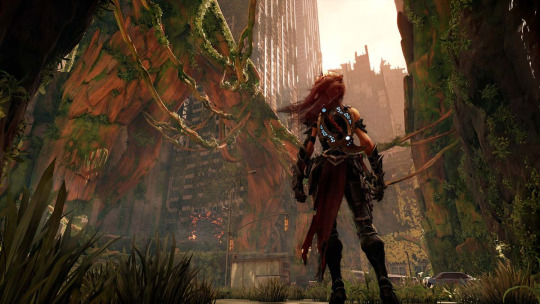
While I find certain story choices baffling, I like that DS3 is doing its own thing to some extent and that thing works. The only joy I got out of combat in the first game was knocking fools into pits, the second game was mostly swapping between light and heavy attacks for me, but here at last I found truly engaging dynamics. They’ve ditched what didn’t work from the last games, rethought things, and the product is all the better for it. Oh, and the Void DLC is a worthwhile addition but the combat arena one was boring and pointless.
15 notes
·
View notes
Text
I wonder if we’ll get exclusive weapons from the Sider Order DLC. I’m not too sure I’d be happy with that, though. I don’t want to have weapons behind a paywall in any of the Splatoon games.
It was fine with the hero mode weapons, as it was more of a skill wall thing, but as much as I’d love to use some of the character’s weapons like Pearl’s Dualies, I don’t want the players of the game who cannot afford the DLC to be at a disadvantage because the DLC weapons are better.
I hope they either appear in the base game when the DLC comes out but you just have to unlock them to use them in the DLC, or they’re exclusive to the DLC and not useable in Multiplayer.
We’ll just have to wait and see…
3 notes
·
View notes
Text

100%'ed Citizen Sleeper over the course of 21.3 hours, with a three-month hiatus between my first playthrough as an Operator, and my second/third playthroughs as an Extractor and Machinist, respectively.
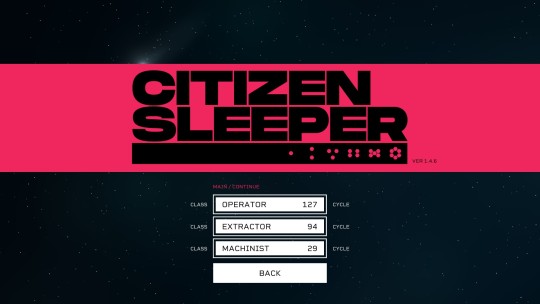
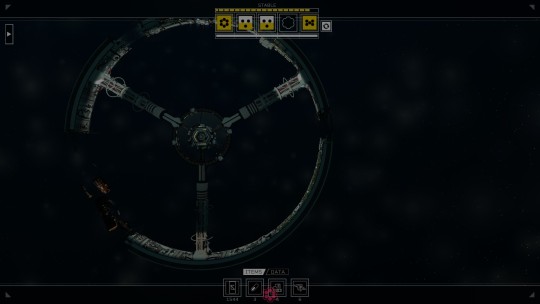
I've always thought that there should be more zoomed-out images of Erlin's Eye throughout the game. Got this one just in time before the fade to black at the end of my first playthrough. I ended with the DLC content. My Operator playthrough is the longest by far because it was my first one. Going blind. I had no prior test playthroughs before. I took things slow, took me ages to find the Tambour because I hadn't fully-explored the Lowend until that part of Feng's questline forced me to. Took even longer to get to the Greenway because the fee was so expensive, and I didn't wanna spend the credits unless I had an excess. Ended up completing his questline just in the nick of time before Maywick became a problem. Never had to interact with Ethan. Hated that mf. Originally, I didn't know that completing Sabine's questline would lock me out of buying any more Stabilizer. I thought I was so fucked. Rationed out my remaining vials like a dragon, learned to repair myself with scraps, and hoarded those, too. I didn't read Sabine's ending dialogue too closely, and found out from fan piece that organic Stabilizer could be grown in the Greenway. It was my only hope, so I threw myself into that task. Obsessively stalked the Greenway for the remainder of my playthrough aside from the DLC. Foraged, cleaned the Avery, and frequented the Wastes for more scrap to repair myself with in the dimmed lights of the Hypha Commune's dorm. By the time I finally cracked the code and ended the questline, I hadn't even spent a single vial of Essen-Arp branded Stabilizer
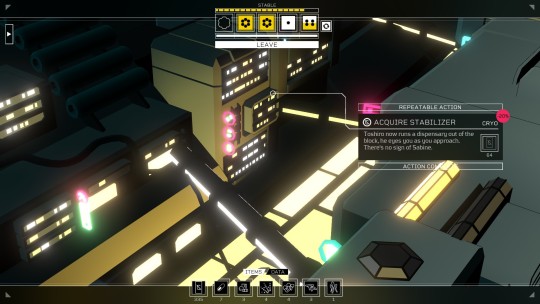
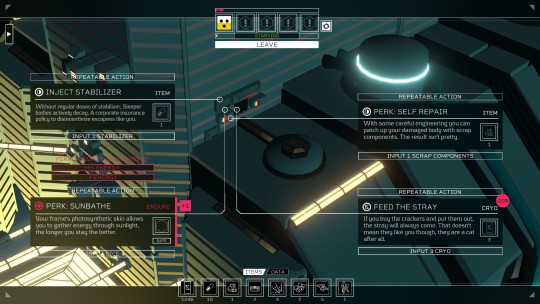
Took these pics during my second playthrough, as an Extractor. Learned from my mistakes of the past. With the excess amount of wealth I had accrued from various jobs, I stocked up on vials before completing Sabine's questline, and at the point that I had unlocked organic Stabilizer, I had 16 vials already bought with hard-earned cash, so it became redundant. There is a fairly-large gap between how the player-character is depicted in the fandom and how you can play in the game. The game-version of the Sleeper would take pity on the fandom Sleeper, and the fandom-Sleeper would simply become another side-character in the in-game Sleeper's world. For on Erlin's Eye, a paradise of wires and code and odd jobs and dirty money. The in-game Sleeper is Deus Ex Machina. God in the Machine.
My final playthrough, as a Machinist, was my magnum opus. My speedrun. Completed in only 29 cycles. A little under a month. In under a month, this Machinist-frame Sleeper came onto the Eye, half-frozen, a mechanical corpse bleeding human emotion trundled over by a corporate machine. Just under a month later, it was riding high. Literally, as it escaped on a solo journey on the Sidereal Horizon. I could have completed the task even faster. The only breaks I gave it were when I, needlessly, pursued the first few steps of Feng and Sabine's questline. The latter only to make Stabilizer a bit cheaper from the pharmacy. Didn't even explore the Rotunda, or even bother with the Greenway. I threw myself into the Sidereal Horizon questline. Of course, I had to abandon my emotions early-on. Giving poor Lem & Mina the cold shoulder, and ignoring their needs in order to get the final achievement. When the Sidereal Horizon was finally completed, and en route to the hub. I let myself rest.
0 notes
Text
Dragon Age 4 Wishlist Part 1
I doubt that all the changes I hope for in this new games will come into fruition at all or as I imagine it but it's fun to think about anyway.
Gameplay
- Scaled Down maps: Despite the sprawling areas of DAI, most felt bloated for sezie with vast tracks of nothing between quest points. Scale down maps with a tight forcus on one or few quests, think the Descend DLC without the absurdly hard enemies.
-Better Quests: Remember the shards everybody hated collecting? A symptom of bigger design problem with large areas that needed content to filled and filled it was with repetitive MMO-styled missions.
More tactical focus: Useless you play on the highest difficulties, combat mostly bolied down to holding a one button and spamming some abilities every so often until you or the other guy was dead. Bring the nuance of combat back with builds, subclasses, and combos
Champions
-Pro-Elvish Elf no self-hating people who threaten to breakup with you after doing anything vaguely Elvish and only get thier character arc done in a DLC released two year after the base game
-Atheist and or Agnostic people who aren't that way because something terrible happen them in past but for natual reasons such as mere skepticism
-Polytheist who's unashamed of thier beliefs and doesn't incorporate the Maker in any shape or form
-A lesbian coded women who's happens a be a lesbian, no more badass swamp witches or tough warmadiens who are totally just Straight(TM).
-Qunari Woman because that's long over down in the series
- Dwarf Woman with a fablous beard decorated with shinning gold and fresh flowers picked on the first day of spring
-A nice spectrum of LBGTQ+ minor character as well.
Companion Don'ts
-Slave apologist who says extreme poverty is worst than chattel slavery even through the system created that poverty and slavery is immoral as a whole no matter how "nice" individuals are
- Member of the Templar Order who's want to replicate the cirlces of the south because of blood magic and demons oh my!
- Freedom fighter shown to be just as bad as their oppressors because of some fool notion of "grey- morality" that's just wishy-washy both-siderism.
And that's Part One, Part Two will cover the character player and romances. Feel free to chime in with own suggestions.
(Slightly edited version)
@magerights
41 notes
·
View notes
Text
Murals in DAI: The Creation of the Veil

This mural is located in Shattered Library; Scholar’s Retreat.
I’m going to share my thinking process in the main body of the post, and a tidy summary of the interpretation of the mural will be done at the end of it.
[This post is part of the series “ Murals in DAI ”]
[Index page of Dragon Age Lore]
We have discussed some alternative interpretations of this mural and questioned the possibility of having been painted by someone else but Solas. All that discussion was done in Shattered Library; Broken Tower and Scholar’s Retreat. From now on, we are going to assume the conclusions we reached in that post, that is:
Solas painted this mural, since it seems to show a deep understanding of the nature of the Veil.
It was painted before the creation of the Veil, like a sketch, or a study, to keep the ideas clear.
Now, let’s proceed to see the parts.
The foreground and the background
Like all the murals that show the composition of the world with different spheres, I think they have “two or three panels” fused in one, using the foreground and the background as different panels. In this case, the four figures that belong to the foreground are the two small spheres and the two eluvians with the elves inside. The background is all the rest.
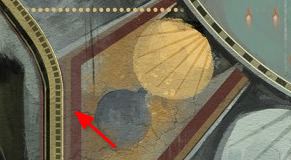
The only interaction between the background and the foreground seem to be a red line that “contains” the yellow/golden bubble area, which stops when reaching the eluvians instead of continuing behind of it.
The new structure of the World
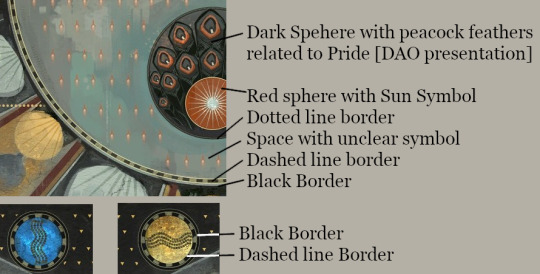
In Murals in DAI: Basics, I already discussed a bit the nature of this structure seen in the sphere. But since these interpretations are not perfect, we can discuss them a bit more.
The central part of the Mural draws our vision to two central spheres: a red sphere with something that looks like a Sun, and around it, a black sphere with 14 peacock feathers.

The peacock feathers were already used in the presentation of DAO, during the cinematic where Duncan explained the sin of the Magister Sidereal. The peacock is a widely accepted symbol of pride in the Western, so it seems reasonable to link this space to Pride. In this sphere, we have seen that other murals [for example, “Siege of Adamant Fortress” from “The actions of the Inquisitor”] represent in this area six eyes, another symbol of Pride in the world of Thedas due to the demons of Pride. This Pride can also be related to Fen’Harel, since in the mural “Self-portrait” we can interpret the Wolf as an aspect of Solas that lurks the Fade, vigilant of the creatures he sealed time ago.
The mural “Creation of the Veil” was presented in Trespasser, as well as the codex “Veilfire Runes in the Deep Roads” which is given to us with the last mural of the DLC [”The death of a Titan”]. The codex seems to imply that after Mythal’s death, “green vines grew and enveloped a sphere of fire”. From all the Trespasser murals, this is the only one which shows a red sphere with an undeniable symbol of fire: a sun [once more, the sun as a symbol in Thedas reappears]. Another red sphere of fire appears in the mural “The Death of a Titan”, but we will talk about that when we try to interpret it. What we can say is that it seems reasonable to link this Red Sphere with that one present in the “The Death of a Titan”.
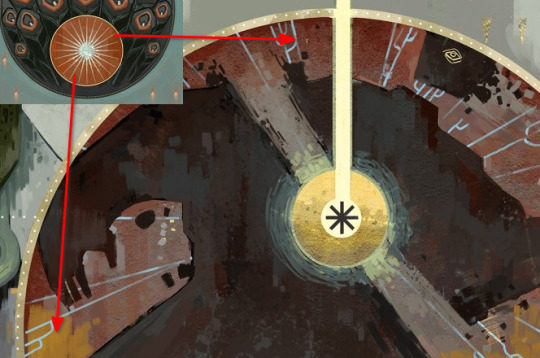
The codex speaks of green vines covering the Red Sphere, but in this mural we don’t have vines. This mural is about the Creation of the Veil, not about the Death of Mythal. However, I think that maybe this is the real reason behind the creation of the Veil. We know that Solas said at the end of the DLC [Somewhere[DLC Trespasser]: Elven Ruins] that the death of Mythal was the reason why he sealed the Evanuris, but the truth is given by the codex and the Dev’s notes in the room where we find the mural of “The Death of a Titan”: the real reason was what Solas [and some other elves] collapsed in the Deep Roads in order to hide and not to “wake it”. The certainty is given to us in the Dev’s notes that we find in the room with the mural “the Death of a Titan”:

So, this seems to be the real cause that Solas wanted to hide and seal, so I’m inclined to link this fire-like red sphere in the codex, represented in “The Creation of the Veil” as a Red Sphere with a sun, as the real thing that Solas had to isolate to avoid its spread. Sadly, we have no way to determine the details of this thing. Maybe some hints can be scratched in the mural “The Death of a Titan”.
As a colourful note, this red sphere and its iconography with fire/a sun seem to be related to the several versions of the unreliable Dalish Tale of Elgar’nan, who shoved a ball of fire/ the Sun into the earth; the closest we get to that image is Fen’Harel collapsing the Deep Roads to hide “a sphere of fire” that has been sealed with vines that only lasted some eons until it finally awoke with angry energy. The Creation of the Veil was the only way that Solas found to control this danger, and he represented it in a cryptic icon of a sun inside a red sphere.

This sphere is sealed inside another: one which is black and it is related to pride. This can be interpreted as:
1) Protected by pride demons, the most powerful ones among the demons so far we know in lore. 2) Protected by an aggressive aspect of Fen’Harel. We know Fen’Harel has six eyes, related to Pride demons. We also know that the true complex nature of Solas has not been disclosed yet completely. 3) These peacock feathers I spoke about in other posts represented the Magister Sidereal, but this interpretation would be anachronistic in this mural: the creation of the Veil goes back in time before the existence of Tevinter. 4) My best interpretation is that the red sphere is wrapped by those whose pride endangered the world: The Evanuris [which in terms of Roles are similar to the Magister Sidereal, who are also represented with these feathers].
So Solas condemned the Evanuris to banishment, sealing them in another Sphere: the black one. We also know that they must have been bound to a body to avoid their presence in the Fade and communicate with Dreamers [Hakkon dlc]. Due to the blackness of this sphere, this seems to be where the Golden City laid once, and where the Blight contaminated it. How the Blight contaminated it? I have some options, and I can’t really incline to any of them:
1) Solas may have sealed the Evanuris around the red fire sphere that ended up tainting them. If we associate the Red Sphere with Red Lyrium, this seems plausible. What feels wrong of this supposition is to think that the Evanuris were contaminated with Red Lyrium and not the Blight, which is a fact: Corypheus already stated that the Black City was filled with Darkness that he embraced [read more in Orlais: Shrine of Dumat]. So I’m not too inclined to this option. 2) Solas sealed the Evanuris that were already tainted by their own actions. This seems to be supported via the codex “Elven God Andruil“ where we can interpret that Andruil came back tainted from the Void. It’s not clear if this contamination was the Blight or Red Lyrium [more details in Ancient Elven codices, Temple of Mythal]. To make it reasonable with Corypheus’ testimony, it should have been the Blight. 3) If we include a bit of old lore, we also know from DAO via Zathrian, that some strong bound processes, specially those against the will of the creatures involved, can cause the spread of curses or disease.
Independently of the situation in which the seal was made, the Golden City turned black and got filled with the Blight.
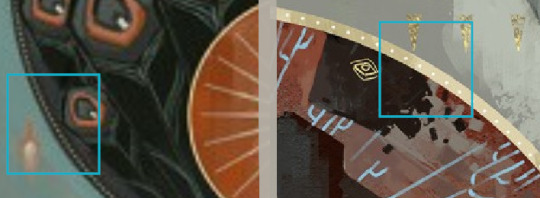
Returning to the Mural: the border of the black sphere is a dotted line. I’m not so sure if I should link this with the mural of “The Death of a Titan”, where the titan is surrounded by a dotted line, making more obvious the idea of “red sphere with fire”. This would imply that the danger that the dead titan released was contained in a dotted lined sphere, where the Evanuris were sealed inside in order to be isolated and suffer eternally [as Solas claims this is how they were banished in the Elven Ruins].

The following space outside the Black Sphere is the grey-blue-teal one, filled with a symbol I have no idea about. This space is contained by the typical line that represents the Veil or barriers as strong as the Veil itself: the dashed line in black and gold, and then a black line. It always looks like a reinforced barrier. These barriers also appear in the small blue and gold spheres on the top corners. This bigger sphere can be interpreted as the Fade, but since the outside of this sphere is depicted with a black space filled with inverted triangles, I’m inclined to think that this grey-blue-teal sphere is a second mechanism of defence: a second barrier after the Veil responsible of keeping out any dreamer or spirit interested in exploring the Black City. This is the true Veil that the Magister Sidereal broke, not the one we did in DAI: walking physically along the Fade is something that some people like Flemeth can do without any consequence. The true transgression is to pass this second barrier.
The silver and golden bubbles
What are they?

The position of the bubbles, if we compare it with the information given by the last trailer, coincide one another:
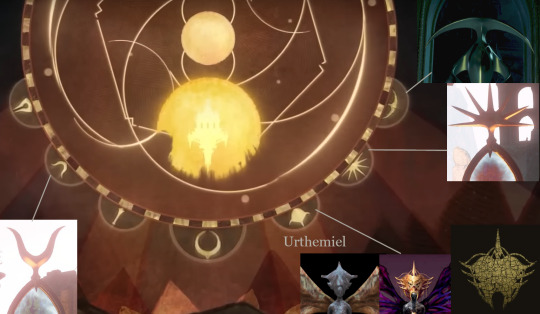
It suggests that the bubbles may be related to the archdemons, whatever they were originally. We need to remember that how they were related to the Elvhen is something we have no information about. The fact that Tevinter speaks of the Archdemons as male entities with the exception of one, and we see winged dragons in their archdemon version [winged dragons are only female] says a lot to me: clearly the Tevinter interpretation of the Old Gods is something different to what these entities truly are, which seem to be related to the Elvhen as well. So, through the identification of the symbol of Urthemiel, I assume the bubbles are different Old Gods, that seem to work as seven guardians or feeders of the Veil [meaning, maybe they keep this stronger barrier up by giving their energy to it].
Why are there silver/grey and golden/yellow bubbles?
If we established that these bubbles can be translated as Old Gods, one can assume the silver/grey ones may represent the “killed archdemons”, but I think that’s a misunderstanding: we need to put things in a timeline. When Solas created the Veil, there were no Blights, and whatever function the Old Gods had at that moment in the elvhenan empire, had nothing to do with Blights, so the silver and golden bubbles have to mean another thing than a mere status of life. I played with several options:
1) The golden ones are on a background of gold colour, while the silver ones, are in “dark” spaces, but the blackness do not touch them. I was tempted to understand this as “four guardians are in the “darkness of the depths”, while the remaining three are “somewhere where there is light”. This is bullshit. So far we know, five archdemons have come from the Underground already. So this interpretation makes no sense.
2) The dotted line, that so far we suspect, may represent up and down, underground or sky. If we see it in the mural of “The Creation of the Veil”, it is placed in a way that makes five guardians to be underground, while two are, at least, on the surface. This interpretation may support the idea that we had five archdemons coming from underground already, but we don’t know what would happen with the next remaining two.
The problem with this interpretation comes when you identify each of these bubbles with a symbol of the incoming Archdemons:

It would mean that the beetle-head creature comes from the underground and the moon-head creature from the surface, making useless the previous hypothesis that the five last Archdemons came from the underground. So, once again, it’s impossible to identify the reason why some are grey and others are yellow.
I think it’s important to highlight, even though I have no idea how to interpret them, is that the space behind the silver bubbles has full reach all over the background, while the space of the golden ones, are contained in red cubicles [see the image below the title: The foreground and the background].
Maybe the colour of these bubbles are related to an intrinsic nature of the guardian that we cannot even fathom. By seeing the image, we can notice that the moon-head creature is related to a grey bubble, same as Urthemiel, while the beetle-head creature, to a golden one. The beetle-head creature can be related to Darkspawn in some way, since darkspawn in DAO used to decorate their territory adding these horns to local statues. The moon-head creature is related to the Deep Roads, since we found its statue in Trespasser, and it is also associated with a sea creature through the concept art of DA:D. Nothing of these bits of information help me to establish some pattern, so it is impossible for me to even speculate what’s the meaning of the colour of the bubbles.
Why are there rays and dark appendages in the bubbles?
Each of these bubbles have the same kind of “rays” that the red sphere in the middle of the mural. I think there must be a link with it, maybe like “gates” that allow us to reach/observe the centre before crossing the barrier? One would immediately think in eluvians, specially if we know that they have a fair chance to be made out of pure lyrium, and the red sphere may be a representation of corrupted [red] lyrium.
As a colourful note, the Chant of Light specifies that there are seven gates in the Black City [once more, we keep having this feeling that the Chantry was a big compilation of Elvhenan history co-opted and modified by humans, where Solas has been transformed in the legendary Maker.]
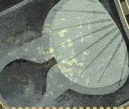
The bubbles also have a black, smaller bubble with an appendage linked to the silver/golden bubble. I have some potential hypothesis:
1) They are the representation of bound processes. We know the Archdemons that Tevinter Dreamers listened may have been other kind of creature than the dragons that arise as Archdemons. There are several reasons to suspect this:
a) The dragons that arise are all female despite the Tevinter’s Old Gods being all males with the exception of one [Razikale]. b) Design-wise, the Archdemons originally were meant to be Cthulhu-esque, demonic creatures. To link them into dragons would mean that they were forced to be bound to them. This hypothesis is valid for any other kind of spirit attached to these dragons. c) We also know that any other potential hypothesis of presenting the Archdemons as evanuris, forbidden ones, or forgotten ones would implicate in the explanation a bound procedure of these souls to the living creature=dragon in order to justify their “silence” in the Fade. This is the only way how the Fade creatures become silent to Dreamers [Hakkon dlc]
2) They are the representation of the resistance to the Blight. They look like cysts, which reminds me the war table quest Learn More about Dragons: the dragons are the creatures with more resistance to the Blight since they can generate cysts that “seal” the Blight. If the Guardians are in contact with the centre of the black and the red sphere, maybe they are enduring the corruption. Since we linked these guardians to Archdemons which we saw as dragons, it makes sense to represent this ability in the mural.
3) Both previous options.
I’m personally more inclined to support option 1, because we have a long list of proofs and examples suggesting that the Elvhanan empire had a deep knowledge about bound procedures; while I’m not so sure they had such an understanding of the Dragons, specially with a disease that didn’t exist until certain point in their history. The Blight was something too new and unknown to truly understand how much a dragon was resistant to it.
The golden and blue spheres
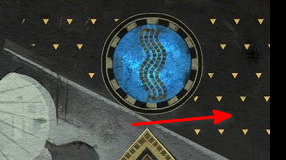
All this complicated structure of spheres is placed in the Fade, hence we see the black background with inverted golden triangles in the top left and top right sides of the mural [more details to understand this interpretation in “Murals in DAI: Basics” ]. So, we are still inside the Fade.
The two spheres we see at the sides of the mural may have multiple interpretations.
They are elvhen orbs, AKA foci, given the relationship they have with the undulating lines and bound processes explained in Murals in DAI: Basics and in the mural of “Removal of the Vallaslin”. The orb of golden colour may be related to Divinity [as gold does in general], the other of blue colour, likely related to Lyrium. This could mean that for this creation of the Veil two orbs were needed to emulate the power of divinity and lyrium combined. My main con against this interpretation is that these spheres have the same kind of barrier we see in the Veil [dashed lines], which makes little sense for orbs. However, it’s true that the Tevinter version of the orbs, called "Somnaborium" was translated as "Vessels of Dreams”, implying that they are containers of Fade magic and may require some barrier, but all this train of thoughts feels too weak for me.
Two pocket worlds. Since each of these spheres have the exact same border than the one used for the Veil, they give the idea of being “places contained by a Veil-like barrier”. We saw this already in the mural of “Removal of the Vallaslin”, which has this line at the top and the bottom of the scene, giving the idea that these pocket spaces can be created inside these barriers. This is also reinforced by the codex Raising the Sonallium. That one is golden and the other is blue may imply that for this creation of the Veil, two pocket worlds were needed: One with Lyrium [that I speculate may be the one associated with the red sphere, since I related it to the presence of Red Lyrium] and the other, with “Divinity”= the Evanuris [which may be represented by the Golden one, since gold tends to be deeply related to Evanuris/god concepts in Elvhenan culture so far their ruins taught us]. Another possibility for the golden sphere is simply “the Golden City”. In this interpretation, the undulating lines may imply that these pocket spaces are “bound”. I insist in this concept because it is very important: thanks to Hakkon we know that bound spirits can’t communicate with mages through the dreams, and we know thanks to The Archivist that the Evanuris have been silent for a long while after the creation of the Veil [so it seems very natural to assume that the Evanuris have been bound to some physical object/creature]. Maybe the Evanuris were bound to lyrium and isolated in the golden sphere. If this unwillingly bound caused some kind of extra corruption [as Zathrian showed us in DAO], or made the corruption of Andruil to spread to the rest and into the lyrium, it could potentially explain the origin of the Red Lyrium and/or the Blight inside the Golden City. This makes sense in a way that would explain why we find Whispers Written in Red Lyrium which talk about “finding the dreams again”. [The red lyrium has many voices, unlike the normal lyrium, which only has one song: the Song of the titans; more details on this in the post “Songs and things that sing and whisper in DA Lore”] . This means that the entities trapped inside the Red Lyrium were creatures of the Fade once, they were in the dreams once. Cole also says about the creation of the Veil when he reads Solas’ mind: “They sleep, masked in a mirror, hiding, hurting, and to wake them... (Gasps.) Where did it go?” Which seems to add a bit more to this interpretation.
The elves in the Eluvians
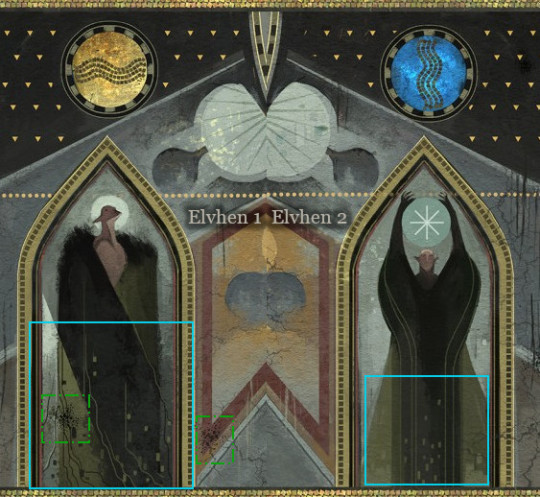
Finally, we reach to observe the elvhen. I suspect this is Solas, the "Maker” of the Veil. Or at least the one I called Elvhen2. I’m not too sure if we have to interpret this part of the mural with the spheres over him or the spheres belong to the “background panel”. I will incorporate them in case they give some context.
Both elves are inside a door or a mirror which shape reminds us of an Eluvian’s. It’s not clear if this means that he made himself the owner of the network of eluvians before creating the Veil to block and destroy the ones that had access to the Black City.
The interior border of the eluvians displays a black and a red wine lines, which colour matches the “red wine cubicle” around the golden bubbles. I’m not sure if we can understand this as if these spaces where the guardian/bubble exists are linked to the eluvians, or they protect eluvians that have access to the Black City.
The Elvhen 2 shows an elf wearing very similar outfit to the elves of “Removal of the Vallaslin” or to the elf of the mural “Self-portrait”. His tidy robes are made of a moss-green and black fabrics. The elvhen holds in his hands a sphere with an asterisk symbol, which we associate with the elven orbs that accumulate power over time [Fade power, more precisely]. This image appears below the lyrium sphere, which makes some sense: the lyrium sphere, pocket space related to lyrium is the one related to “The Death of a Titan” [asterisk symbol]. We know that the power to destroy and/or control Titan’s minds [orb/asterisk symbol] allowed the elves to mine Lyrium.
The elvhen 1 shows a halo behind his head, a symbol of divinity [we see this halo in Mythal’s mosaic, check Evanuris]. His robe now looks more like a fur, which seems to imply this is Fen’Harel. And this is happening under the golden sphere, which may represent divinity as well. This could be what Solas told us at the end of the dlc in the Elven Ruins: he was called Fen’Harel for his enemies, not Solas. Fen’Harel was perceived as a god, even though he may or may not have rejected the power of divinity [I’m not sure because the Ancient Elven codices; Fen’Harel’s mountain ruins are written by Fen’Harel’s followers, and they romanticise him in excess. Solas seems to have a pragmatic attitude, so if he needed the power of a god to seal the Evanuris, he would have used it] Would that mean he used all his power [or perceived “divinity”] to create the Veil? The golden sphere represents divinity after all. Maybe this part of the spell is what exhausted him to the point he needed to slumber for a millennia and still yet he was too weak to unlock the elven orb power.
What I find more interesting here is the lines and decorations of the elvhen’s robes: the Elvhen 2 may be Solas, with lines straight and clear in his robe. The Elvhen 1, who may be Fen’Harel, has his outfit is a bit more messy, with twisted lines [the blue squares in the image]. This detail can be understood as his purpose being twisted [he was more related to Wisdom and Knowledge as Solas, while as Fen’Harel, his purpose started to change into Rebellion]. The change of purpose may produce a twist in the harmony of an elf, since they have a spirit-like nature, even though they are not exactly like a simple spirit. This information has been repeated many times by Solas himself, and even the Avvar in the dlc of Hakkon confirmed it.
The other interpretation is that this mess in his fabric may be his regret. We know that thanks Tevinter Nights, he has been feeding a demon of Regret since the day he created the Veil [the “regret of a god”]. The splashed of ink we see in the green squares looks bit similar to the messy figure of the black wolf in his last tarot card:
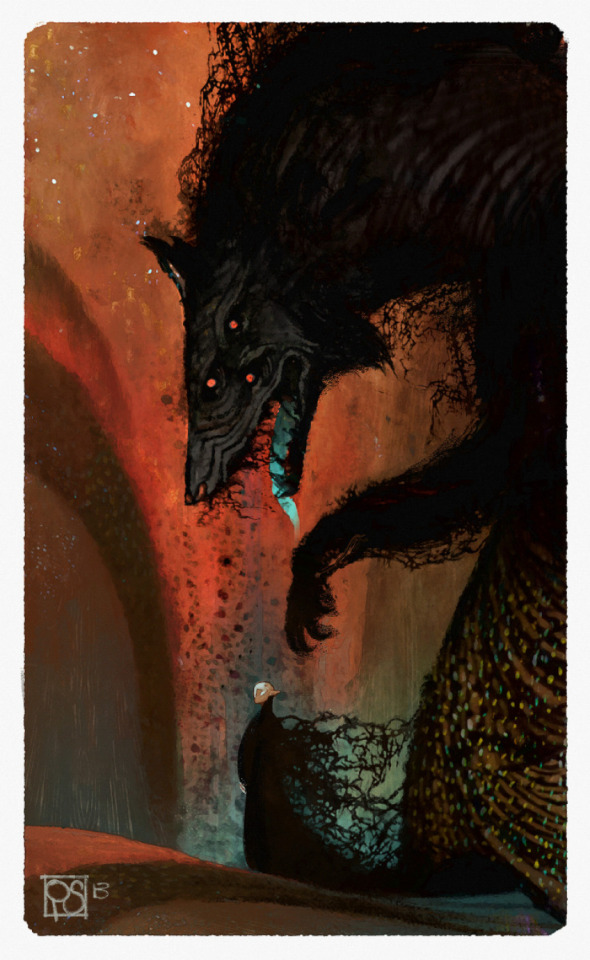
Solas has incorporated a new role to his personality since that day. He seems to have started his life as Pride, becoming more complex when sharing wisdom and knowledge, and recording information. Then, later in his life, he incorporated Rebellion, and he embraced it with Pride.
By the banter he has with Varric, Blackwall, and Sera, as well as his tales of the things he saw in the Fade, he seems to enjoy and treasure the acts of Rebellion in all situations, even though he regrets the “War” aspect that Rebellion needs. His banter with Blackwall shows a lot of regret in this aspect that Tevinter Nights translate into the big demon of Regret. These details can be seen too through Cole’s lines that show that Solas’ original role was more related to Teaching and Wisdom than Rebellion and War. And at some point, he needed to start changing his role:
"Wisdom knows enduring is pain. He hurts for her, another of many he couldn't save. He carries necessary deaths."
“In his own way, he knew wisdom, as no man or spirit had before.”
"Bare-faced but free, frolicking fighting, fierce. He wants to give wisdom, not orders."
Integral interpretation

The central part of the mural has a red sphere with a sun, which represents the real reason why Solas banished the evanuris: it was not only the death of Mythal but “something else” that the Evanuris had “unleashed”, and that the elves sealed with collapsed stone and magic. This terrible thing may be related to The Horror of Hormak. In a sense, Fen’Harel “hid” a sphere of fire (the Sun) in the underground [this historical event seems to be reflected in the unreliable Dalish Tale of Elgar’nan]. We may suspect this Sun is some kind of danger related to the Death of a Titan, the corruption of a titan, or the corruption of its blood: red lyrium.

In any case, this space seems to have been sealed with the Evanuris inside, and isolated again to make impossible to access to it from the Fade. This is the true Veil that the Magister Sidereal broke when they entered the Black City, not the Veil that the Inquisitor crossed.
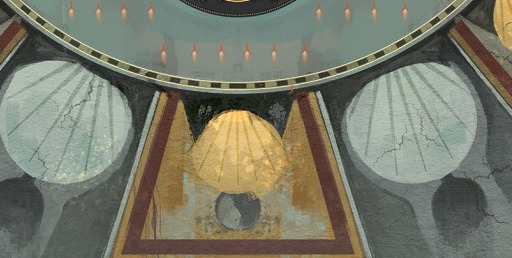
This Veil is protected by seven bubbles that seem to represent the Archdemons when compared with other murals and iconography of the series. There is no way to suspect what’s the meaning of the grey and yellow colour of the bubbles. The rays inside them seem to suggest some kind of surveillance on or direct connection to the red sphere, which has a Sun with the same kind of rays. This reinforces the idea of the bubbles being guardians of the main danger that has been sealed beyond the barrier.
The bubbles have dark bubbles with appendages that may represent bound procedures: these archdemons/dragons may have been bounded to some Fade creature: we don’t know if they are bound to the Evanuris, Forgotten Ones, Forbidden Ones, or other spirits.

The two spheres on the top of the mural seem to represent two pocket worlds. One filled with lyrium [blue one], the other filled with the Evanuris [golden as in “Divinity”] or it simply represents the Golden City. The undulating lines in them may indicate bound procedures, where lyrium and the Evanuris were bound to the Golden City. The bound procedure may have caused some disease that may explain the origin of the red lyrium or the Blight, or maybe Andruil, contaminated with any of them, spread it to the rest of the Evanuris when this bound procedure was executed. There is a fair possibility that the whispers found in the Red Lyrium are the Evanuris bound to it.

The elvhen in the mirror may represent Solas’ journey through the creation of this Barrier: from an elvhen mage called Solas who had the power of an orb [The Anchor],

to the divine and feared furry figure of Fen’Harel, whose actions changed his purpose and, therefore, changed Solas. This even may have started to twist his personality and feed the Regret demon that became a gigantic monster by the time he was part of the Inquisition.
#solas#High speculation#DAI murals#Archdemon#evanuris#red lyrium#the blight#blight#elven orb#asterisk symbol#golden halo#the sun symbol
14 notes
·
View notes
Text
Malvernis
Malvernis, also known as The Pestilent One, is a strange creature who is introduced in the DLC Legacy. He is a spectral dragon but also seems to be considered an ancient demon who threatened the Dwarven Empire long ago.

Along the short path we follow into the Carta Hideout, there are three small pillars with a symbol that I don’t know what it is [a book icon? a house?] but we will find it again in DAI in the Western Approach: the Old Chantry Trail Signs.

These monoliths in DA2 seem to perform the same function than in DAI: they are pointing out a secret location where something unique exists: Malvernis. [this function only works that way in the DLC. In the DA2 base game they only offer codices. Each of these monoliths, however, trigger different codices about Amgeforn:
Amgeforn the Wasteyard
Amgeforn the Lonely Vigil
Amgeforn the Foul
If we analyse each of the codices, we gather pieces of information with a potential interpretation:
The Pestilent One is slumbering, if it awakes, the air fills with fetid odour, you hear a sound of drums, and will ask you to take an orb.
The dwarves consider Malvernis a poison to the Stone.
Sharpers bound it: chained in lyrium stained with the blood of hundred warriors.
"Within the orb, it hungered, it waited."
Paragon Ilona [probably a sharpers since they were the ones who bound it] ordered to seal this creature and leave one single watcher per generation from the Warrior caste on the surface. A worthy and necessary sacrifice to preserve the Stone.
It "devoured" taighs: living creatures were turned into slime.
There is no date of these events to place Malvernis in time.
With all these small vague fragments of information, I can come up with three weak hypothesis.
Malvernis could be an ancient demon like Imshael. Since these demons are so unique in their own style, we could consider that Malvernis’ particular preference for thaigs and dwarves instead of the living on the surface had to do with its peculiarity. However, it’s hard to believe that a demon, even an ancient one, could have more interest in the Stone than in living creatures. Malvernis has an orb and part of its essence is within it, apparently, [if these codices are reliable, which is something we can't say for sure]. We know that's not exactly how demons work at all, not even rare ones [Forbidden ones] like Xebenkeck, Imshael or Gaxkang. From the three options, I see this one less likely with the little information we have. However we saw already a demon having a reflection of a spectral high dragon in DAO with the Baroness [check The Blackmarsh and the High Dragon].
Another alternative could be that Malvernis is one of the Sideral Magisters
He is called The Pestilent One, a denomination that follows the style of Corypheus when he is called “The Elder One”.
He is slumbering, sealed like Corypheus. He makes people listen a sound of drums, and asks you for an orb [although, people doesn’t need to be blighted to hear him]
The fetid odour can potentially be consequence of being tainted after stepping into the Golden City.
The skin used to represent Malvernis has a human shape [it’s bulkier than the thin elven one] but this can be just a technical issue. It’s DA2 after all.
However, it makes little sense that a magister can put a bit of himself inside an orb. We know Corypheus can do it with a dragon, maybe this one can do it with an object like Flemeth did? I don’t know, it feels a lot of speculation without any proof.
The part of devouring living creatures makes little sense when you think in the blight or the corruption of the Red lyrium, which are self-sustaining. If the Pestilent One is similar to Corypheus, we know the blight itself sustains them, he should not need to “devour” stone or dwarves.
Last option: He could be a lesser elvhen mage [who never made it into being an evanuris] or a forgotten one
We know that Andruil went to the Void and brought disease in her and her weapons. So it seems fair to assume that anyone living there, where the Forgotten ones were exiled [according to the unreliable Dalish Tales but also the codices found in the Shattered Library], gets corrupted. That could potentially explain the pestilence theme with Malvernis.
We know elvhenan have songs inside [Cole talking about Solas in banter], and in Trespasser it was hinted that those entering to Uthenera were part of a unison song. There seems to be something related to the elven nature and a natural song in them. Corrupted and diseased, Malvernis could have a corrupted, sick song; similar but not the same as the Darkspawn have.
It is a poison to the Stone: we know the evanuris mined the titans and used lyrium. They know about the lyrium veins and the power of it.It’s even possible that they were responsible for the blight and the red lyrium. Poetically, the Evanuris poisoned the Stone. On a more literal note, if this creature is tainted with this pestilence condition, it could infest other parts of the Stone with its disease, so the dwarves needed to seal him.
It has an orb which keeps a piece of himself inside, like Flemeth and the amulet that Hawke carried to Marethari. Like Solas and “his power” locked inside his own orb.
It turns himself into a [spectral] dragon. The only characters we know who can do that is Flemeth and the Baroness, whose nature was more of a demon, but at the same time, she had bound-items that seemed to grant her dual shape.
As a con to this option, it's strange that a powerful elvhenan mage could be sealed and restrained by lyrium and blood magic performed by dwarves. Solas had to create the Veil to keep the evanuris sealed. Malvernis’ seal is quite cheap if even dwarves can do it.

By exploring the Carta hideout, we find a warm orb in a chest. As soon as we touch it, some companion will claim to hear a drum.The signs of its awakening are evident. Sadly we have no visual about this orb’s shape to suspect if it's remotely related to an Evanuris' orbs.


If we walk back to the entrance, we will find a "pulsing obelisk", which is not other thing than one of those Strange Skull-Dragon totem.
We know these structures are later used in DAI to create pits of undead and to fence places related to blood magic. It’s hard to say if they are Tevinter in nature or Elvhen. Here, in DA2 it feels more like a reuse of an asset.

When touching the obelisk with the orb in the inventory, a burst of energy is released and we see the figure of Malvernis, a creature which is not clear what it is. By the mere shape of its skin looks like they used a human model and not an elven one. So what is it? Maybe it's a demon? Maybe it's a dragon? A Forbidden One? Impossible to know for sure.
His armour is something we didn't see in the game so far I remember, so I imagine it was exclusively designed for him, which is interesting: it seems to be done with stones, giving an impression of a profane, if you will. It glows in blue, that can or cannot be related to lyrium. We can’t see its face since it’s covered with a mask. However, he doesn’t use gloves, so we can see his humanoid skin.

Its final design in Heroes of Dragon Age shows a tabard with a symbol that it’s impossible for me to point out what it is. I think I never saw it before in-game.

His combat is a bit more complex than the standard, since he summons minions: ghostly archers and ghostly skirmishers; and then he turns into a dragon. We know so far in the series that evanuris or high servants of them [like Morrigan if she drinks from the well of Sorrow] can be able to turn into dragons. But there is nothing more to add or think about it.

Sadly, the loot it drops [ichor and smite] gives us no additional information to suspect its nature. Malvernis remains quite a mystery from a lore point of view.
[Index page of Dragon Age Lore ]
3 notes
·
View notes